Tags :: Drama
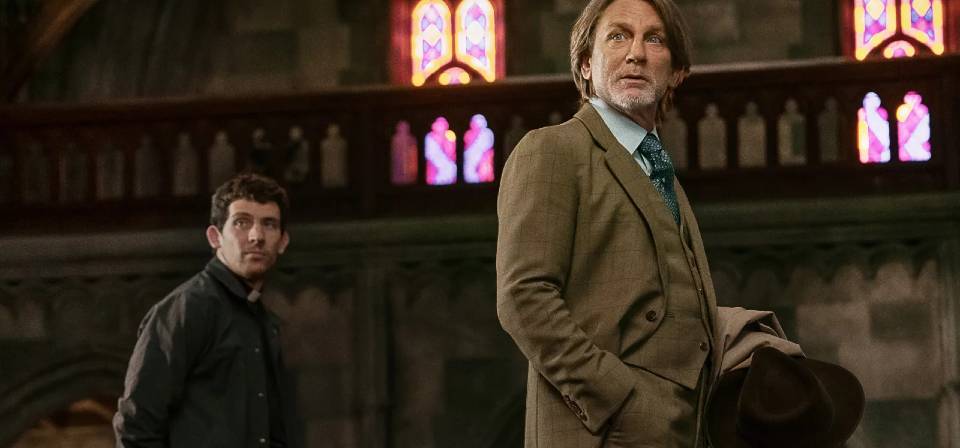
Benoit Blanc goes to church: Mysteries and faith in Wake Up Dead Man
Wake Up Dead Man is about an impossible murder, among other impossible mysteries; it is also about the sociopolitical implications of two opposing conceptions of Christianity and of Catholicism in particular.

The Life of Chuck: Stephen King and Mike Flanagan on life, death, and the end of the world
“Whoever saves one life, saves the world entire.” That saying from the Talmud — popularized as a tagline for Schindler’s List, in which Ben Kingsley’s Itzak Stern quotes the line — is not used in The Life of Chuck, but in my mind it might as well be.
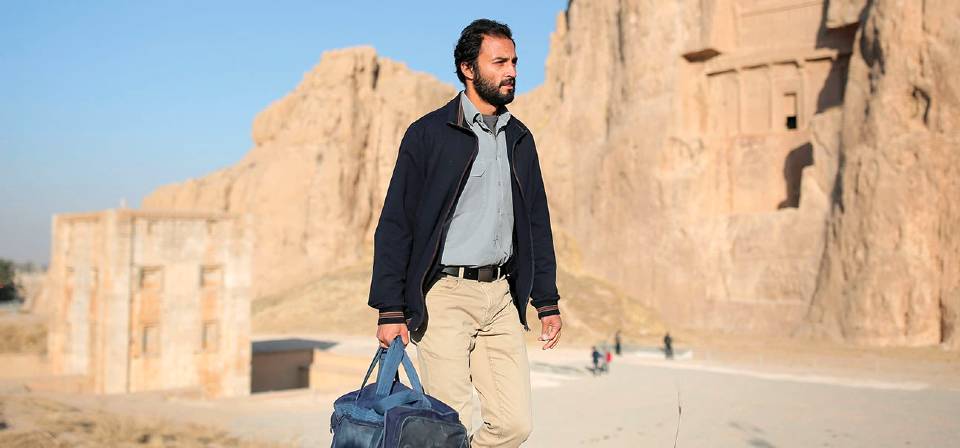
Asghar Farhadi’s masterful A Hero: A decent man does the right thing, more or less
One of the things that makes Iranian filmmaker Asghar Farhadi (A Separation) such a riveting storyteller is how persuasively he imagines sympathetic characters who are more or less trying to do the right thing finding the consequences of that “more or less,” that small bit of wiggle room, compounding and spiraling out of control in unforeseen directions.
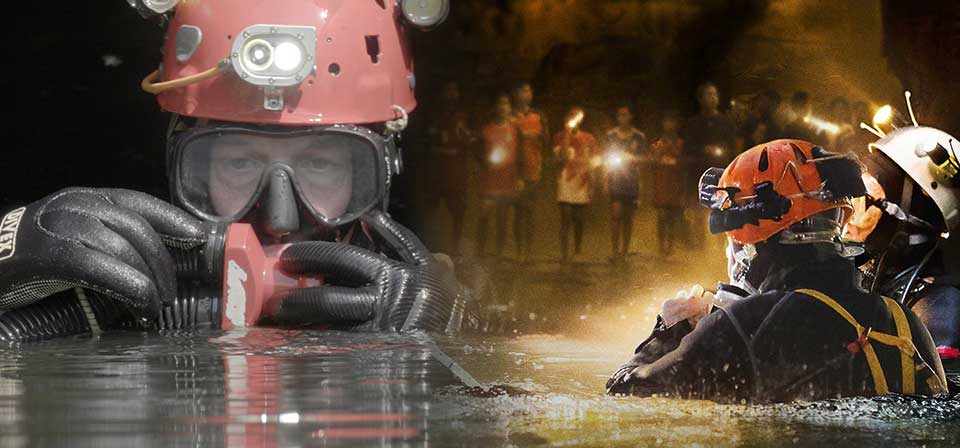
Too good not to be true: Two movies about the Thailand cave rescue
Perhaps you were glued to the news in 2018 as the world followed the ultimately successful efforts in Thailand to rescue the 12 young boys of a soccer team and their assistant coach from the Tham Luang Nang Non cave who had become trapped by sudden flooding. If you haven’t checked in on the story since then, though, you have no idea.
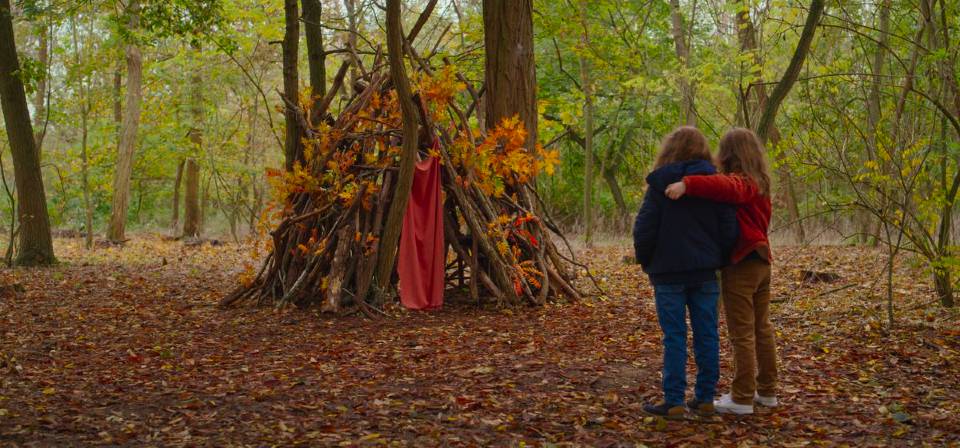
Petite Maman: A quietly powerful fairytale about childhood, loss, and ties that bind
For a child, losing a grandparent can be part of growing up, a coming-of-age experience; losing a parent for an adult can be an encounter with childhood, especially if it involves going through the contents of the household they grew up in, the actual stuff of their childhood.

Cyrano (2021)
Dinklage swaggers and glowers magnificently and sings decently, but he’s at his best in quiet, intimate moments, especially with Roxanne and with his confidante Le Bret, the only one who sees his pain.
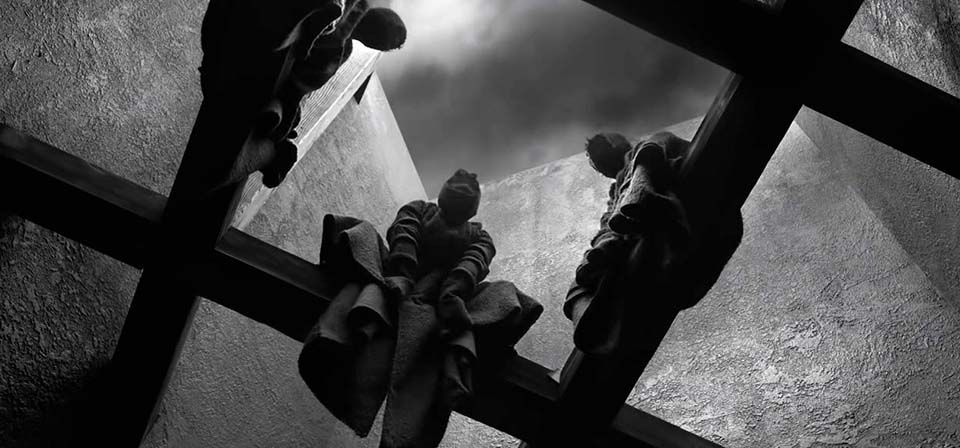
The Tragedy of Macbeth (2021)
Fog and mist, translucent pavilion sidewalls, blowing curtains, dark water, shadows, reflections: the film is full of motifs evoking the murkiness in which Macbeth’s last days play out.

King Richard (2021)
As rousing sports films and inspirational biopics go, while King Richard is far from a pitiless, warts-and-all inquiry, it has a particular kind of truthfulness, analogous to the truthfulness of a family scrapbook or stories recounted at family reunions.
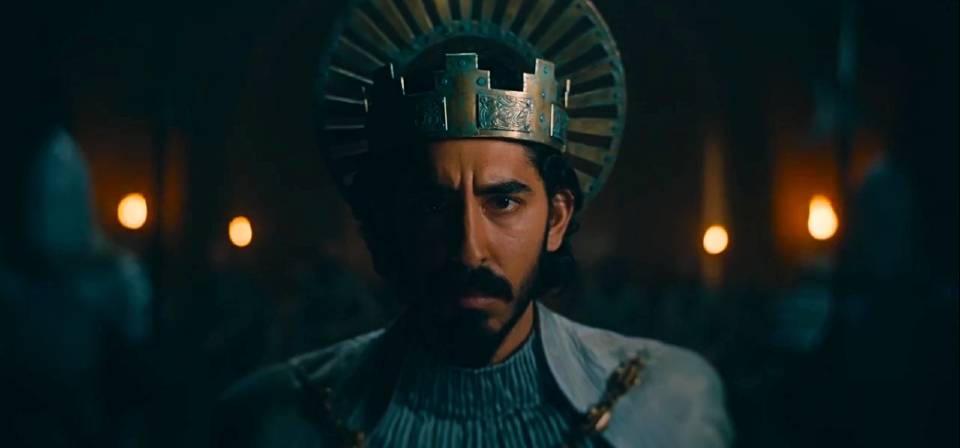
A deep cut: The Green Knight
After the library of books that is the Bible, no literary corpus means more to me than Arthuriana, and no Arthurian work means more to me than Sir Gawain and the Green Knight.
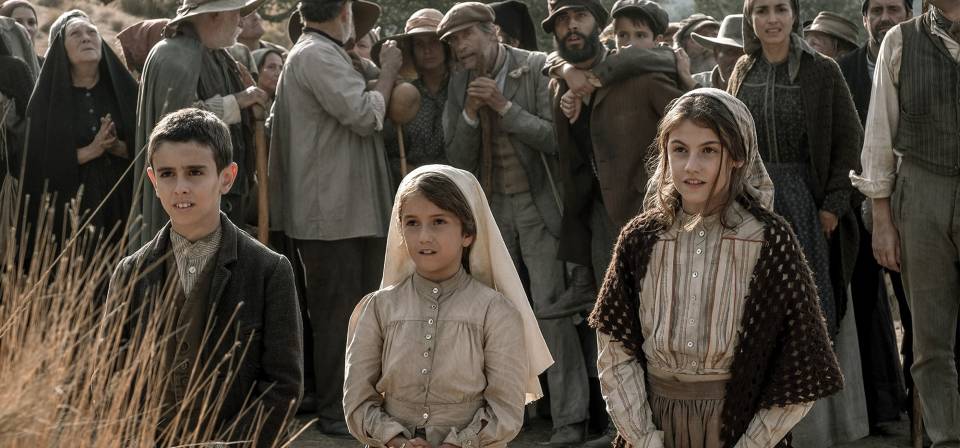
Fátima (2020)
Marco Pontecorvo’s Fátima is the first screen version of the Marian apparitions at Fátima and the “Miracle of the Sun” I’ve seen that feels like the characters are living through the story’s events in the present tense.
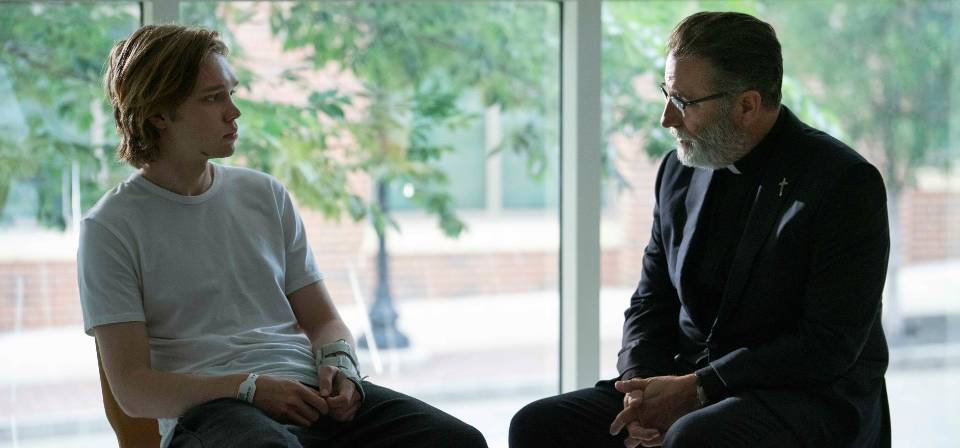
Words on Bathroom Walls (2020)
Halfway through I found myself rooting for the film to be the best version of itself, a sign that a film is working even when it’s not completely successful.
![Parasite [video]](/uploads/articles/parasite.jpeg)
Parasite [video] (2019)
Bong Joon-Ho’s brilliantly constructed art-house hit is the most powerful of this year’s many takes on the theme of haves and have-nots.
![Little Women [video]](/uploads/articles/littlewomen.jpeg)
Little Women [video] (2019)
Is there anything new to say about Louisa May Alcott’s beloved, much-adapted classic? Thrillingly, Greta Gerwig finds that there is.
![Marriage Story [video]](/uploads/articles/marriagestory.jpeg)
Marriage Story [video] (2019)
Noah Baumbach tells persuasive stories about unhappy families. This is one of his most insightful.
![The Irishman [video]](/uploads/articles/irishman.jpeg)
The Irishman [video] (2019)
Robert De Niro, Al Pacino and Joe Pesci star in Martin Scorsese’s decade-spanning gangland opus, which turns out to be a very different movie than it seems … but you have to stick with it.
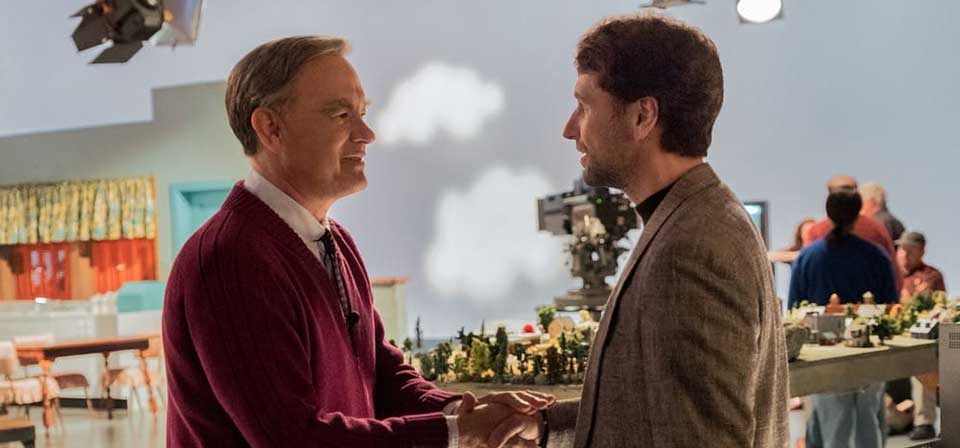
A Beautiful Day in the Neighborhood (2019)
Mr. Rogers’ Neighborhood holds a special place — it would not be too strong to say a sacred place — in the hearts of many. Yet that neighborhood is an infinite distance from where we live now.
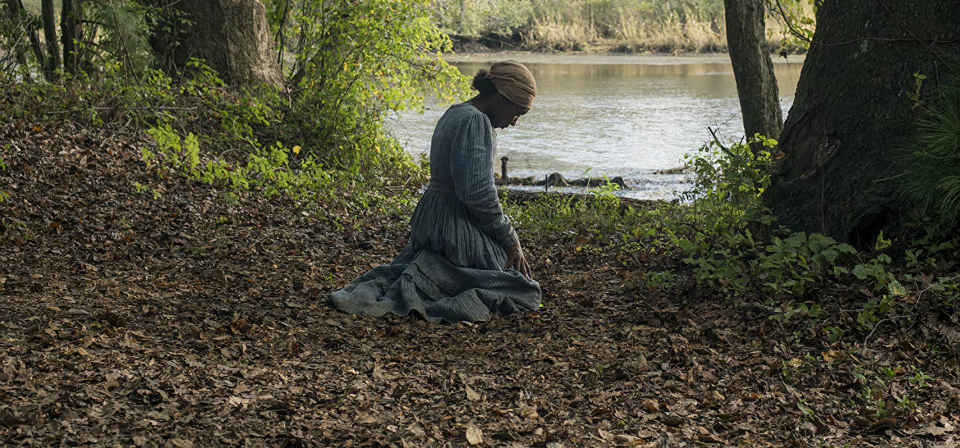
Harriet (2019)
The strongest scene in Kasi Lemmons’ Harriet might be a moment when its indomitable protagonist appears at her weakest.
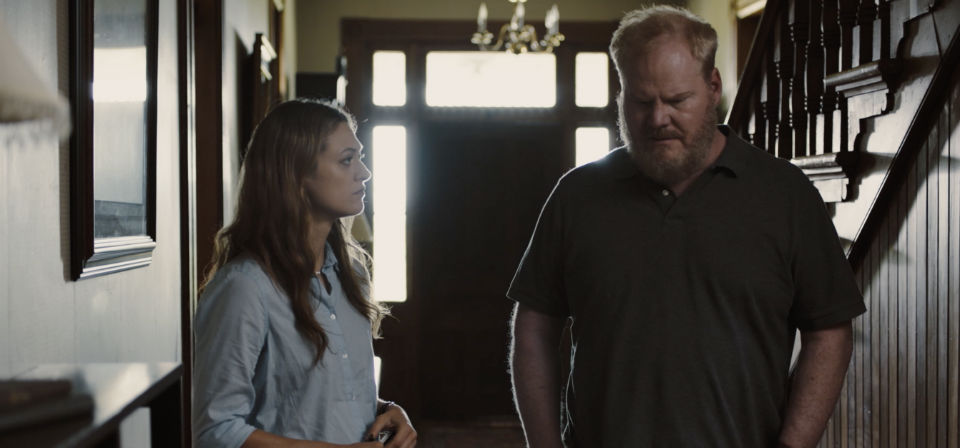
Light from Light (2019)
I’m tempted to call Light from Light the first ghost story I’ve ever seen that I completely believe.
![By the Grace of God [Grâce à Dieu]](/uploads/articles/bythegraceofgod.jpeg)
By the Grace of God [Grâce à Dieu] (2019)
Near the end comes a moment when Alexandre is asked whether he still believes in God. The scene cuts from a complex reaction shot, the question left unanswered. The point, I think, is neither to affirm faith nor to deny it, but to highlight the stakes. By their action or inaction Church leaders make God more credible or less credible, instill faith or shatter it.
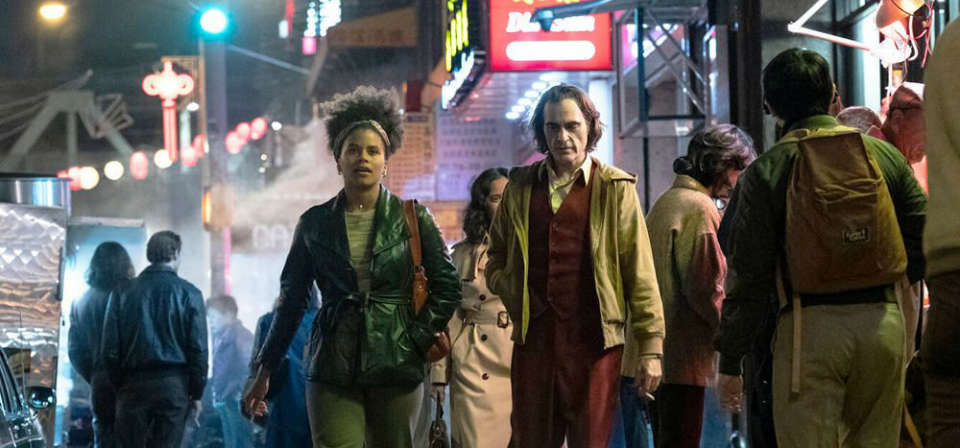
Joker (2019)
Is it possible, in the world of Joker, to believe in real heroism? Do the filmmakers even care about that question?
![Once Upon a Time … in Hollywood [video]](/uploads/articles/onceuponatimeinhollywood.jpeg)
Once Upon a Time … in Hollywood [video]
Quentin Tarantino’s gifts are impossible to deny, but while I often find his set pieces mesmerizing, I have yet to fully buy into one of his films. This might be the closest one yet, though.
![The Farewell [video]](/uploads/articles/farewell.jpeg)
The Farewell [video] (2019)
Fans of NPR’s This American Life already knew that Lulu Wang had an extraordinary story. What we now know is that she is also an extraordinary filmmaker.
![A Star Is Born [video]](/uploads/articles/starisborn.jpeg)
A Star Is Born [video] (2018)
So Bradley Cooper can direct and sing as well as act, and Lady Gaga can act as well as sing. The music is solid and sometimes excellent, but does Hollywood’s fourth take on this story have anything new to say?
![Roma [video]](/uploads/articles/roma.jpeg)
Roma [video]
“No matter what they say,” the mother tells the maid, “we women are always alone.” More than any other 2018 film about unreliable men, Alfonso Cuarón’s Roma is a tribute to women holding their worlds together.
![The Rider [video]](/uploads/articles/rider.jpeg)
The Rider [video] (2018)
The lead actor in this film told me he feels much closer to God in the South Dakota Badlands than in New York or Paris. There were more theologically explicit films this year, but none that brought God closer to me.
![Widows [video]](/uploads/articles/widows_vid.jpg)
Widows [video] (2018)
There’s a lot to appreciate about this film from director Steve McQueen and Viola Davis, except the moral universe the film asks us to inhabit for a couple of hours.
![The Hate U Give [video]](/uploads/articles/thehateugive.jpeg)
The Hate U Give [video] (2018)
If a parent having The Talk with their kids to you means the birds and the bees, you ought to watch this movie.
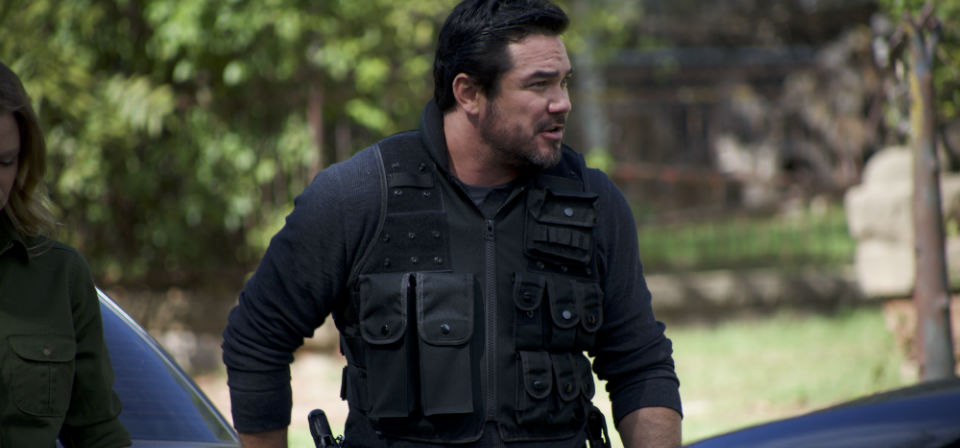
Gosnell: The Trial of America’s Biggest Serial Killer (2018)
Gosnell is subtitled The Trial of America’s Biggest Serial Killer (echoing the similar subtitle of the book by producers Phelim McAleer and Ann McElhinney) — but notorious abortion doctor Kermit Gosnell isn’t the only one on trial here.
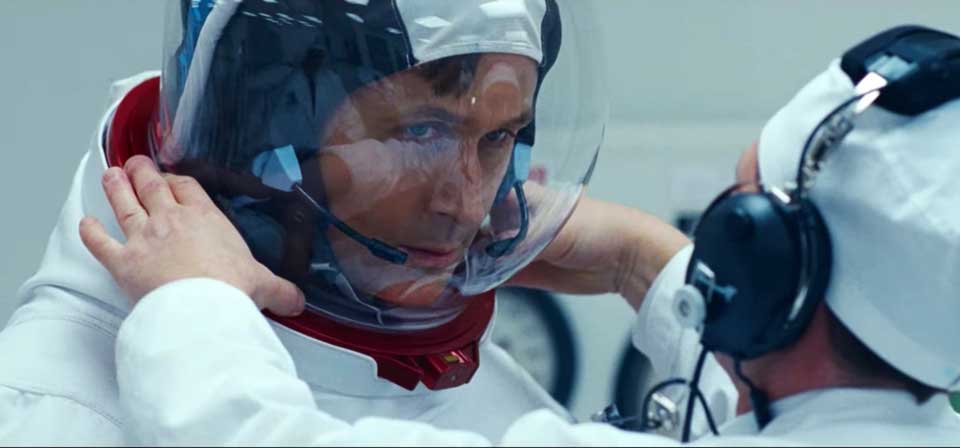
First Man (2018)
First Man is Damien Chazelle’s third film in a row about special individuals whose quest to achieve great things is linked to emotional isolation from others.
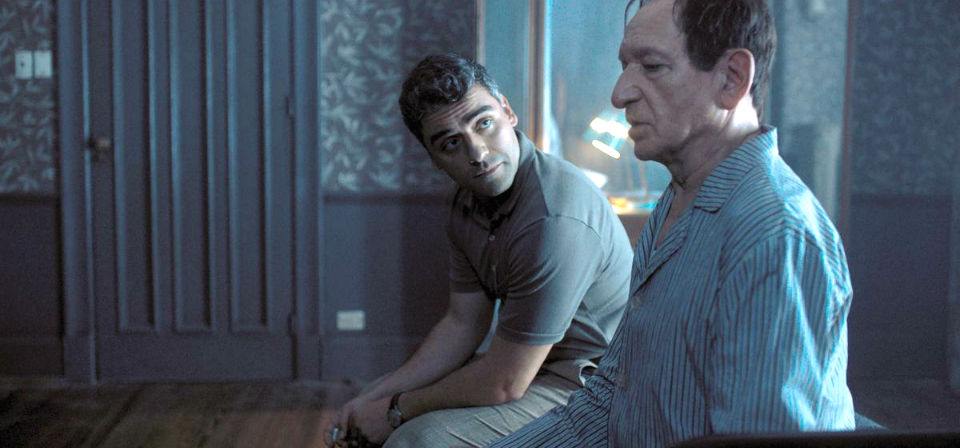
Operation Finale (2018)
It was the experience of reporting in Jerusalem on the 1961 Adolf Eichmann trial for The New Yorker that led the philosopher Hannah Arendt to coin her famous phrase “the banality of evil.”

First Reformed (2018)
Schrader makes greater use than ever before of what he calls the “transcendental toolkit” — but it’s still very much a film from the writer of Taxi Driver. If Toller partly evokes Bresson’s wan, saintly curé, in time we see that he’s also part Travis Bickle, which can be as difficult to watch as it sounds.
![Tully [video]](/uploads/articles/tully-vid.jpg)
Tully [video] (2018)
A messy, thought-provoking film about motherhood from the makers of Juno and Young Adult? Go figure.
![Phantom Thread [video]](/uploads/articles/phantomthread.jpeg)
Phantom Thread [video] (2017)
There is a certain fascination in how fascinated Paul Thomas Anderson and Daniel Day-Lewis are in material that is not fascinating.
![Mudbound [video]](/uploads/articles/mudbound.jpeg)
Mudbound [video] (2017)
The more firmly rooted in a sense of time and place a film is, the more revelatory it often is of the present.

The Unknown Girl (2017)
Jenny will do a lot of listening in the drama that follows. First, though, will come a moment when she does not listen — the only time in the film she ignores a bid for her attention, but that one time hangs over the rest of the film.

Menashe (2017)
It has been jokingly suggested that all Americans are Protestants — even Catholics, atheists and Jews. There’s a meaningful insight there, although even as a joke it’s an overstatement, and insular communities like the Hasidim manage to resist American cultural identity far more than most. Menashe is different, though I wouldn’t want to suggest that he is a Protestant Hasid. It would be fair to say he’s a bit of a resister or nonconformist, if not quite a rebel.
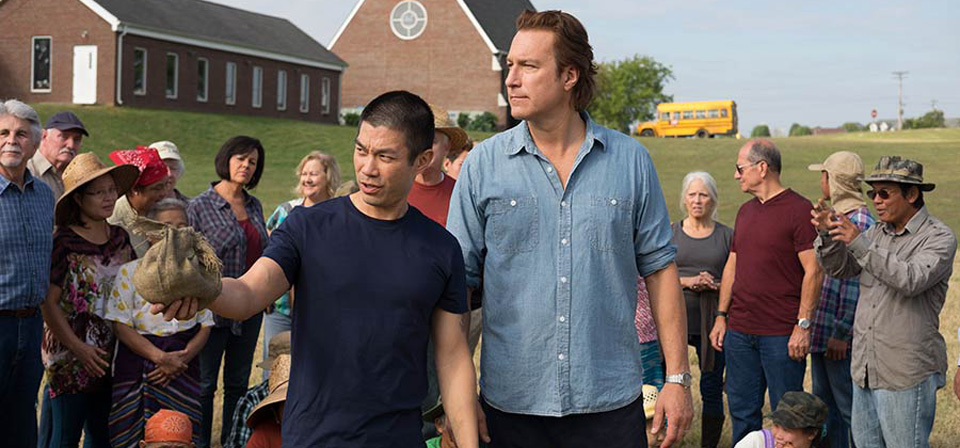
All Saints (2017)
All Saints opens with the most familiar of pious Hollywood setups, the clergyman tasked with saving a threatened church (school, orphanage, etc.). Then something unexpected and kind of wonderful happens.

Detroit (2017)
Kathryn Bigelow’s Detroit has an important story to tell, but what story is it?
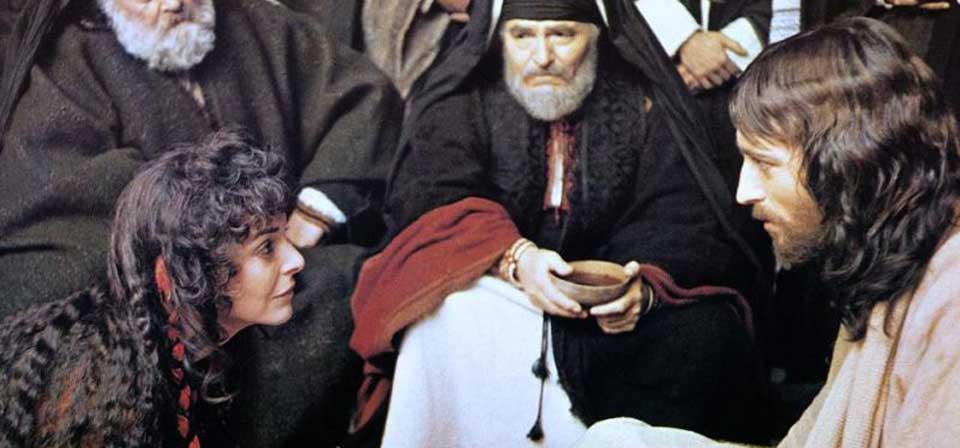
Jesus of Nazareth (1977)
After the four Gospels, if one text is more influential than any other in the tone of Jesus of Nazareth, it might be the Vatican II declaration on the Church in relation to non-Christian religions, Nostra Aetate, a watershed document in Jewish-Catholic relations.
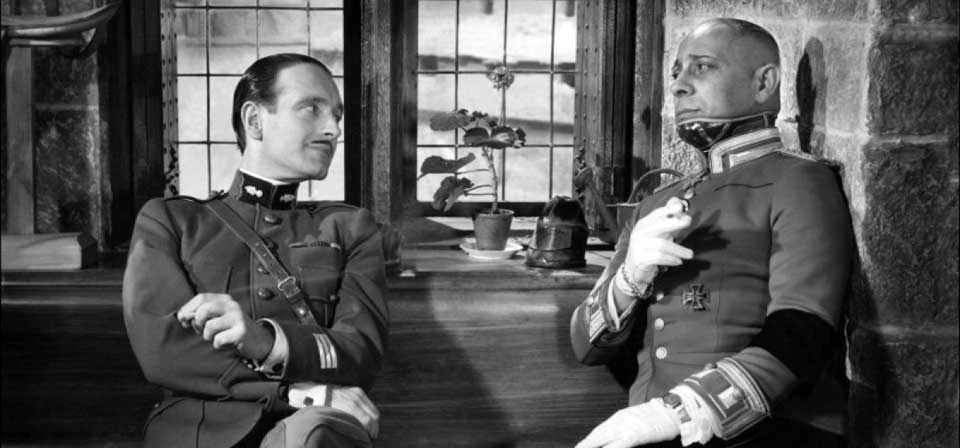
Grand Illusion (1937)
Asked what he was trying to do in Rules, Renoir is reported to have said, “I don’t care.” With Grand Illusion, it may not be much easier to say what he’s trying to accomplish, but there is no doubt that he cares.

The Leopard (1963)
One comes, like these Redshirts, as a cultural sightseer to The Leopard, with its palatial grandeur, replete with lavish, painterly images of the bygone glory of the Italian aristocracy: already in their own day semi-mythological figures, as we see in a vignette in which Father Pirrone, tries to explain to the common people the mysterious ways of the nobility: “They live in a world apart, not created by God, but by themselves.”

Paterson (2016)
For the second year in a row, my favorite film is a winning love story named for an urban area more or less in my backyard.
![Loving [video]](/uploads/articles/loving.jpg)
Loving [video] (2016)
So much better and more satisfying than the courtroom drama it could have been.

Silence (2016)
When 17th-century Japanese authorities in the time of the Tokugawa shogunate found it necessary to send the colonial powers of Europe packing and their European Jesus with them, they didn’t just shatter the missionaries’ bodies. They shattered their narrative.
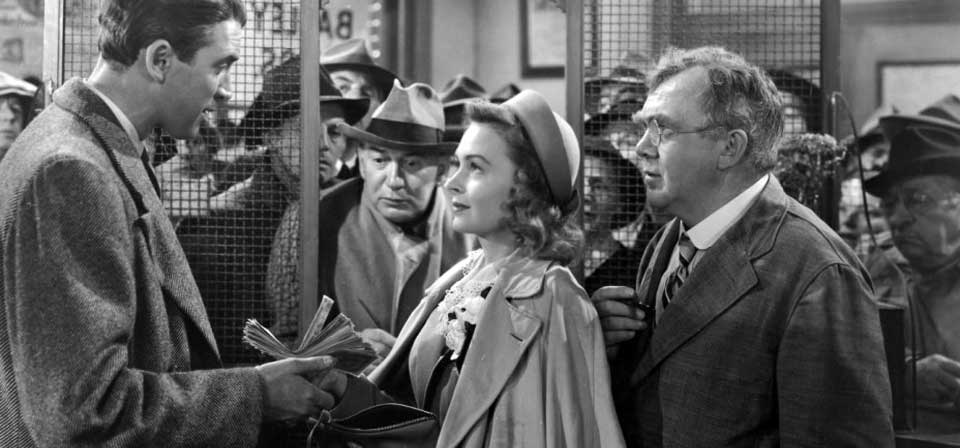
It’s a Wonderful Life (1946)
The truth is that It’s a Wonderful Life is both darker and more subversive than its popular reputation as cheery holiday “Capra-corn” would suggest, and more robustly hopeful than cynics and hipster deconstructionists would have it.
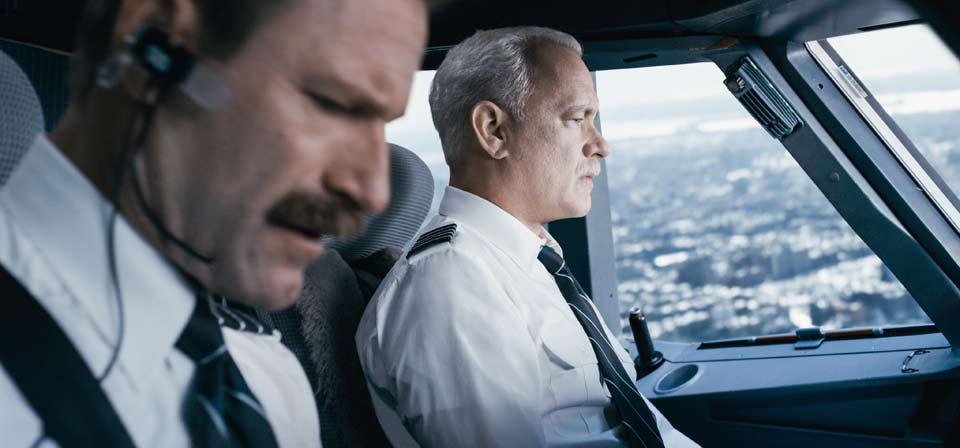
Sully (2016)
Many actors come to own the roles they play so completely that once you see them, you can’t imagine anyone else in the part. Tom Hanks plays roles in which you can’t imagine anyone else even before you see him.
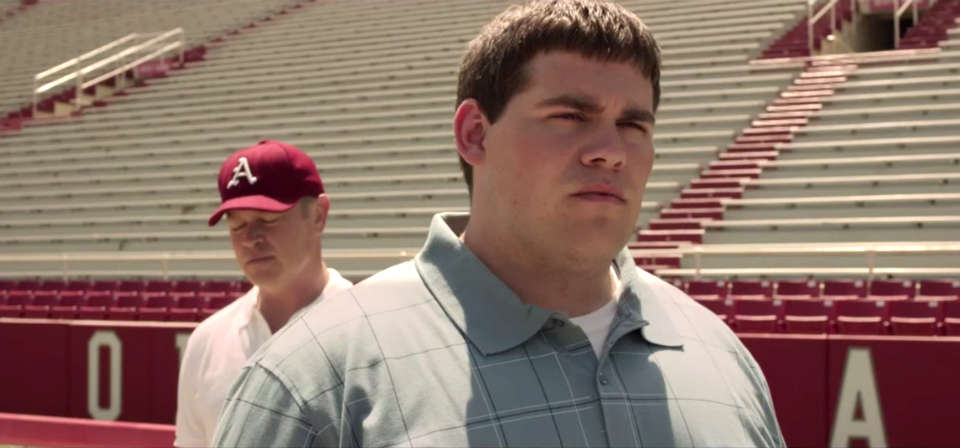
Greater (2016)
Greater has three surprises, which is three more than most faith-based films, particularly of the inspirational sports-movie variety.
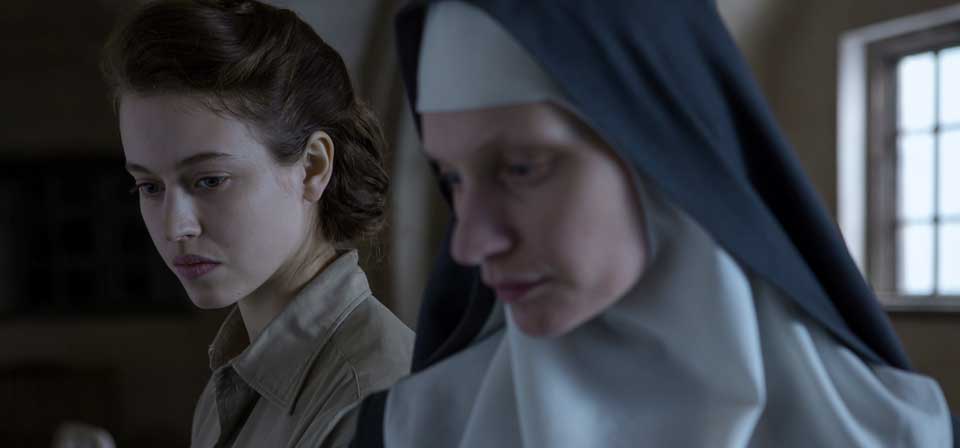
The Innocents (2016)
The Innocents opens in a Benedictine convent in Poland in 1945, shortly after the event known, not without bitter irony, as the liberation of Poland by the Soviet army.
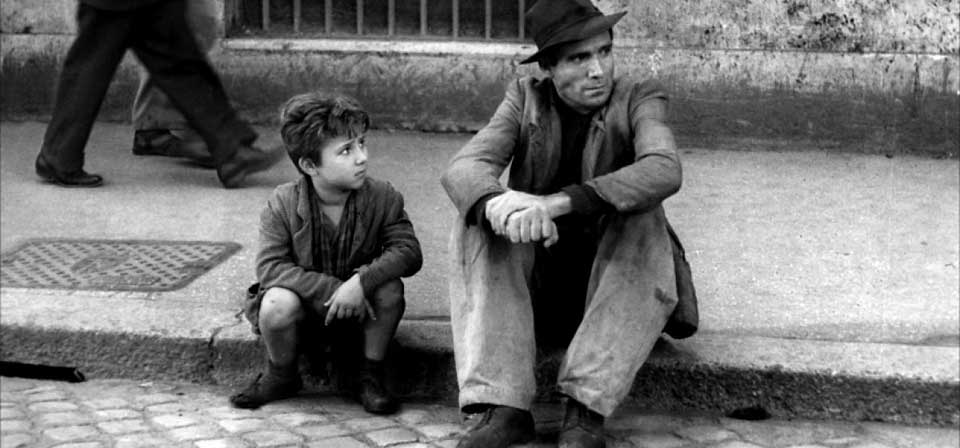
Bicycle Thieves (The Bicycle Thief) (1948)
Relate the plot of Bicycle Thieves in a few sentences, and a person who had never seen the film might be forever haunted by it.

Brooklyn (2015)
Brooklyn is what seems like an increasingly rare gift: a film about the drama and discovery of an ordinary human life: about love and loss, sorrow and self-discovery, in a story that for once is not overshadowed by some deep injustice or extraordinary human conflict.

Spotlight (2015)
We cloak the monstrous in euphemisms. We call it “unspeakable” or “unthinkable” — designations that are accurate simply because in using them we make them so. In Catholic circles a dozen years ago, one sometimes heard about “The Crisis”; later it became “The Scandal.” We all knew what these terms referred to, but did we really know?

Timbuktu (2015)
A haunting scene in Timbuktu depicts two teams of young athletes running back and forth on a field engaged in offensive and defensive patterns familiar the world over: kicking, dribbling, passing, blocking. All that is missing is a ball and goal markers.
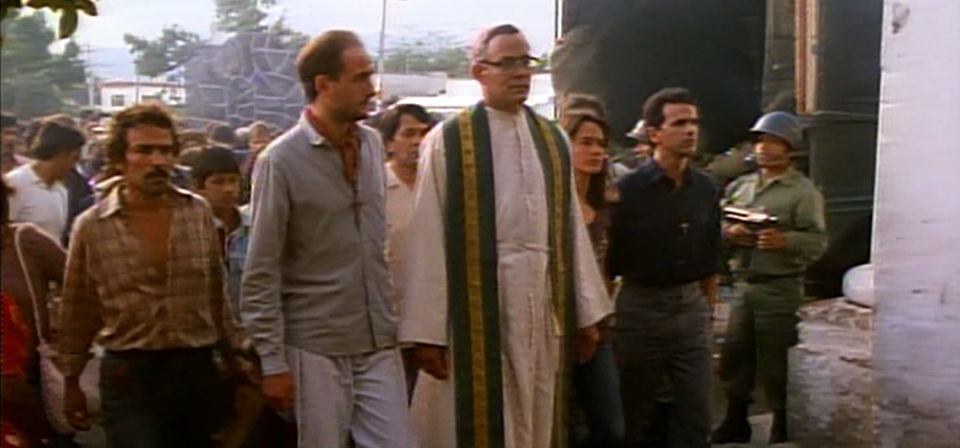
Becoming Saint Óscar Romero
The recent beatification of Óscar Romero, Archbishop of San Salvador from 1977 until his assassination in 1980, has drawn new attention to the gap between public perception and reality regarding this popular but controverted figure in El Salvador’s turbulent history. For those interested in beginning to understand who Blessed Archbishop Romero really was, the Christopher Award–winning 1989 film Romero, starring Raúl Juliá, isn’t a bad place to start.
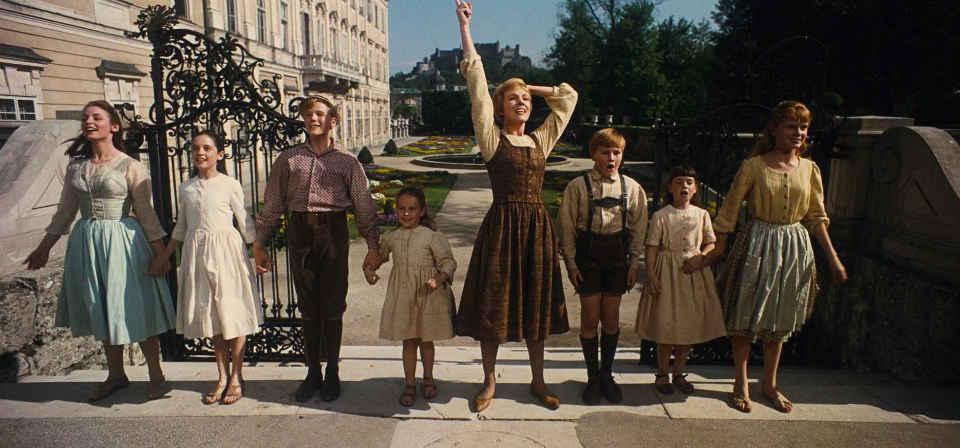
The Sound of Music (1965)
Half a century later, The Sound of Music is probably still the world’s favorite big-screen stage musical adaptation. Joyous, gorgeous, comforting, full of (almost) uniformly spectacular songs, the film’s emotional power is irresistible, even for the many critics, such as Pauline Kael, who hated its shallowness and emotional manipulation.
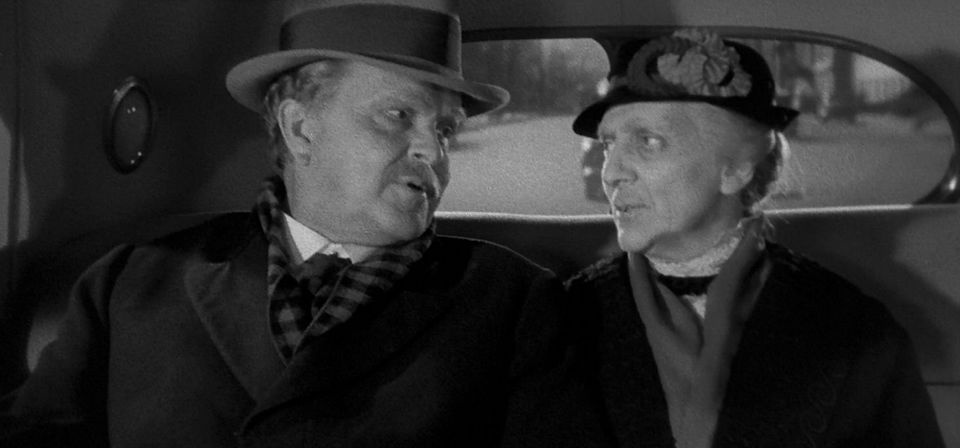
Make Way for Tomorrow (1937)
Any time I run across a list of movies people probably haven’t seen but should, one title I look for is the Catholic director Leo McCarey’s forgotten humanist masterpiece Make Way for Tomorrow.

Two Days, One Night (2014)
It is about self-interest and empathy, practical necessities and moral choices. It’s about the importance of work and the ruthlessness of economics based purely on self-interest and competition. I can think of no film that more persuasively or powerfully illustrates in human terms what popes from Leo XIII to Francis have been talking about for over a century regarding the dangers of pure capitalism unrestrained by moral concerns.
![Boyhood [video]](/uploads/articles/boyhood.jpg)
Boyhood [video] (2014)
I’m not sure we get to know any characters in all of cinema quite the way we get to know Mason Evans, Jr. and his family.
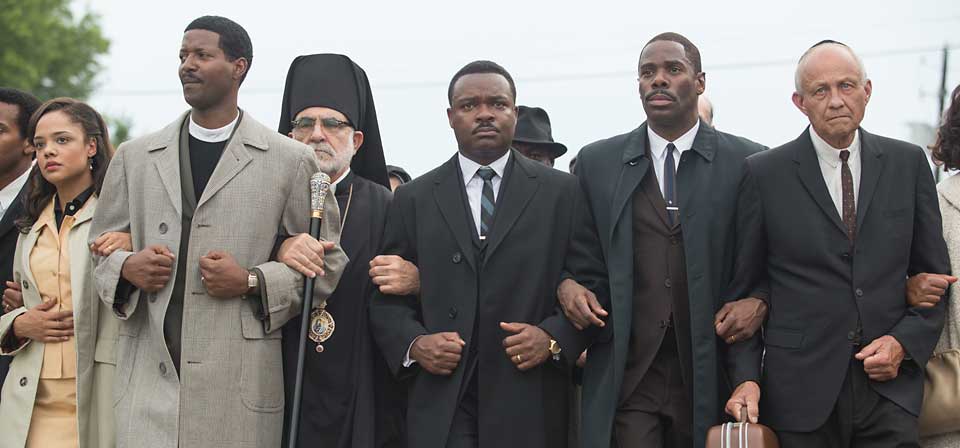
Selma (2014)
Selma achieves something few historical films do: It captures a sense of events unfolding in the present tense, in a political and cultural climate as complex, multifaceted and undetermined as the times we live in.

Unbroken (2014)
Angelina Jolie’s Unbroken is an honorable movie about an inspiring true story. It is impeccably crafted, with a raft of remarkably talented people behind it. It is a celebration of the old-fashioned virtues of duty, grit, fortitude and honor. In the end, it tips its hat to faith, forgiveness and reconciliation. The film I just described is a film that, on paper, I should love.
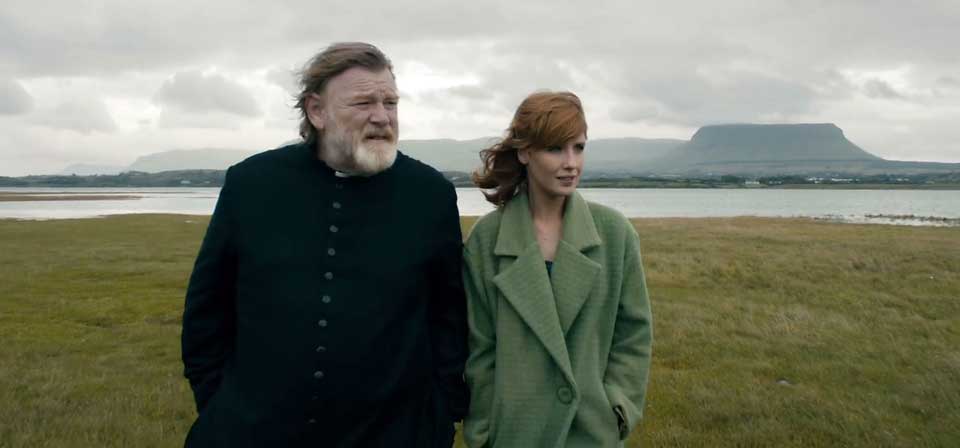
Calvary (2014)
Sometimes misleadingly described as a dark comedy, Calvary is certainly dark, and there are sporadic bits of absurdist humor. In keeping with its title, though, it really is a passion play, with Father James as an innocent victim to be sacrificed for the sins of the Church.
Magic in the Moonlight [video] (2014)
Watching Woody Allen’s latest, starring Colin Firth and Emma Stone, is like watching your uncle doing a card trick you’ve seen him do a hundred times.
Get On Up [video] (2014)
From the star of 42 and the director of The Help comes a film I enjoyed more than either of those.
The Hundred-Foot Journey [video] (2014)
While I didn’t care for this movie as much as I hoped I would, I will say I went right from the theater to an Indian restaurant, where I got something I enjoyed more.
![Chef [video]](/uploads/articles/chef.jpg)
Chef [video] (2014)
I watched pretty much the whole second half of this movie with a smile on my face.
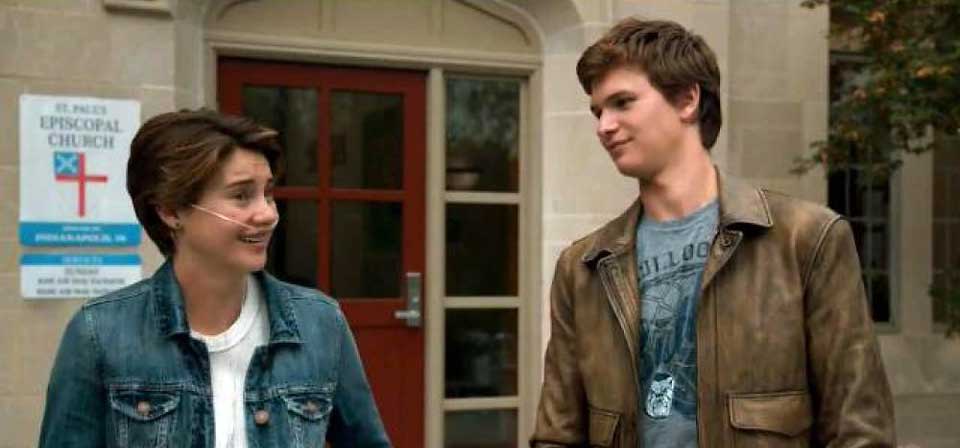
The Fault in Our Stars (2014)
The Fault in Our Stars — in cinematic as well as literary form — cares quite a bit about silly questions, such as the meaning of life and death and love and suffering in a universe sliding toward oblivion, and whether there is Something beyond giving some larger context to our existence, choices and experiences.
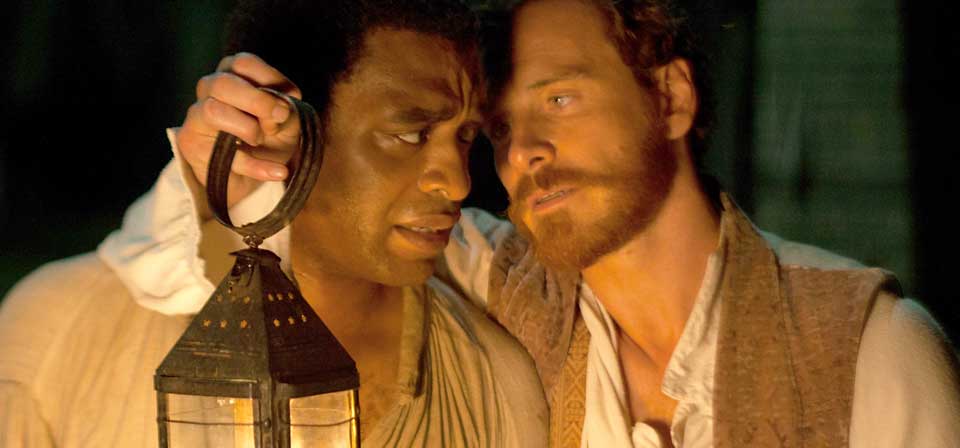
12 Years a Slave (2013)
What if I were to tell you that there has never until now been a major historical motion picture about the slave experience in America? Could that possibly be true?
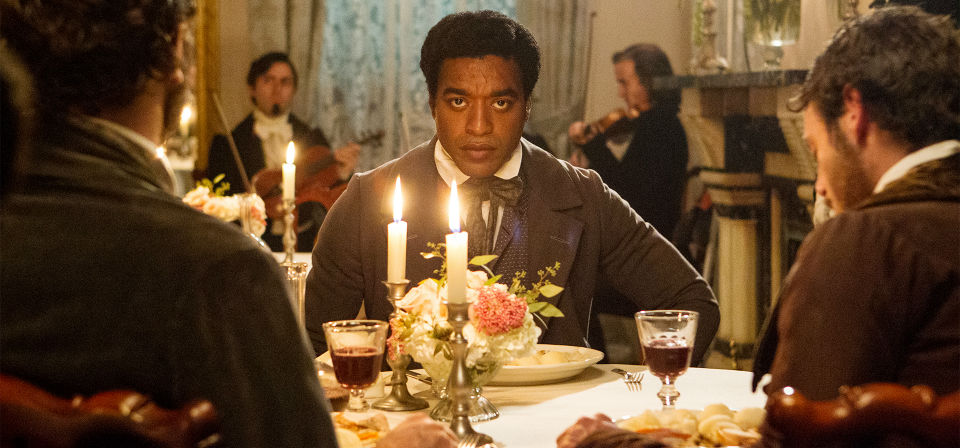
The Untold Story of Slavery? Why 12 Years a Slave is Essential
I can’t believe I never realized it until now, but I can’t think of another fact-based motion picture about the slave experience in America — that is, a movie about slavery in the United States told from the point of view of actual, historical slaves, many of whose stories were published by abotionists prior to the Civil War and by civil rights activists after it.
![Fruitvale Station [video]](/uploads/articles/fruitvale-station.jpg)
Fruitvale Station [video]
Oscar Grant just might be the most memorable character I’ve encountered on the big screen this year.
To the Wonder [video]
To the Wonder in 60 seconds: my “Reel Faith” review.
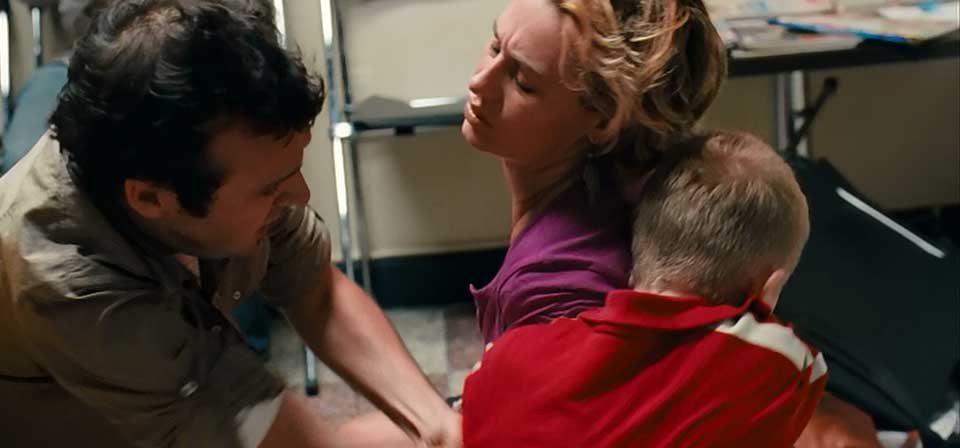
The Kid With a Bike (2011)
Here is a film that will break your heart, fill it with hope and challenge you to say Yes to God and to your neighbor, all at once.
Mrs. Miniver (1942)
Jan Struther, who created Mrs. Miniver for a series of newspaper columns later published in book form, was also the author of a number of Anglican hymns, including “Lord of All Hopefulness” (a staple in our family’s evening devotions). That biographical detail puts an interesting light on the religious elements in William Wyler’s Oscar-winning adaptation, Mrs. Miniver.
Grand Hotel (1932)
Grand Hotel was the first film in history to fully realize the power of the Hollywood star system — the first all-star ensemble Hollywood film.
Lincoln (2012)
Steven Spielberg’s masterful Lincoln might more accurately have been called The 13th Amendment — and while the choice of the more marketable title is easy to understand, the more crucial decision to limit the scope of the film to the last few months of Lincoln’s life, and to focus less on Lincoln himself than on the political machinations of bringing about his most enduring legal legacy, must have been harder to make.
Argo (2012)
The fact-based premise is almost enough to sell Argo by itself. Argo opens and closes as a tense political spy caper, but it’s also an affectionate send-up of the movie-making process. The old advice to writers to “write what you know” is applicable to movies about movies, from Singin’ in the Rain to The Artist, and few subjects inspire Hollywood — or appeal to movie fans and film critics — more reliably than Hollywood itself.

Finding Nemo (2003)
(New review for 3-D rerelease) Andrew Stanton’s Finding Nemo is the best father-son story in all of Hollywood animation, and maybe animation generally. It’s also a stunningly gorgeous film that exploits the potential of computer animation like no film before it and few films after it.
For Greater Glory (2012)
For Greater Glory tells a story of religious freedom and oppression that is far too little known, and that would be important and worthwhile at any time, but is strikingly apropos in our cultural moment.
We Have a Pope [Habemus Papam] (2012)
In a way it’s like the antithesis of a Dan Brown novel. Brown’s stories peer with feverish, lurid imagination at the inner workings of the Catholic hierarchy, discovering all manner of ridiculous subterfuge, ruthlessness and skulduggery. Moretti’s film hardly peers at all.
October Baby (2011)
October Baby is at its most thoughtful contemplating Hannah’s unresolved feelings about her biological mother and the tragic way that her life began.
War Horse (2011)
In War Horse Spielberg harkens back to an earlier cinematic age, creating something more like a Golden Age Hollywood epic than any film I’ve seen in years, the one other notable example being Baz Luhrmann’s Australia.
J. Edgar (2011)
The life and work of J. Edgar Hoover offers grist for a dozen different movies or more, and Clint Eastwood’s J. Edgar wants to be all of them at once. It’s the sort of staidly respectable, competently directed biopic that gives a bad name to competently directed biopics, and possibly to respectability.
Footloose (2011)
The upshot is that this new Footloose is a dumbed-down, sexed-up take on a story that was already risqué and not too bright — one that shies away from the ’84 film’s critique of the church, but is also further from its lingering Christian worldview.
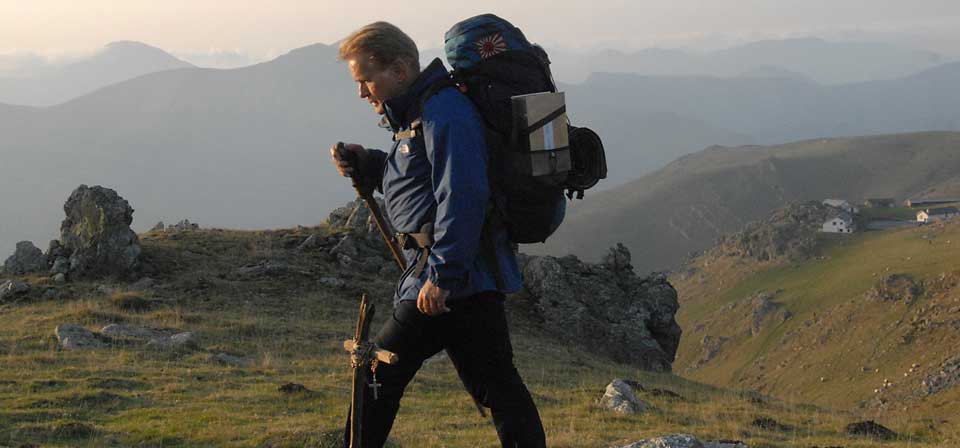
The Way (2011)
Is there grace for such pilgrims as these? Perhaps, but it may not take the form they seem to be seeking. At the end of the road, some viewers might feel let down at what has not changed for the main characters, but perhaps this is to miss the change that matters most. Emilio has said that the film is “pro-people, pro-life.” So it is, in more ways than one.
Courageous (2011)
Coming on the heels of Fireproof, Courageous is the fourth film from Sherwood Pictures, and it’s another step forward for the church-based film company … While the film’s church-based roots and the tendency toward didactic, schematic storytelling are still in evidence, Courageous is their most ambitious and watchable film to date.
Moneyball (2011)
Moneyball is an ugly name for such an exhilarating film. Indeed, it seems a misnomer, though the filmmakers were more or less stuck with it, since Michael Lewis’s explosive 2003 book, on which the film is based, made such an impact on the baseball world that the word has passed into baseball jargon.
Warrior (2011)
Warrior opens with a rash of Christian iconography and references: a Pittsburgh church adorned with Eastern-style three-bar crosses from which we see Paddy Conlon (Nick Nolte) emerge; a rosary dangling from his rearview mirror as he drives home to discover his estranged son Tommy (Tom Hardy) waiting on the stoop of his house; a Bible that Tommy contemplates on Paddy’s table.
The Help (2011)
Based on Kathryn Stockett’s best-selling 2009 novel, The Help is largely about the daily humiliations and injustices to which black maids and nannies working in white homes were subject, and the invisibility of these humiliations to their white employers, until, in this fictional account, their stories are told, first in secret and then in public.
Crazy, Stupid, Love (2011)
In spite of these problems, I’m more struck by the movie’s generosity and empathy toward all its characters, and by its frank, countercultural clarity that acts such as adultery, divorce, casual sex and promiscuity — however understandable they may sometimes be, and however seemingly rewarding they may feel at the time — not only don’t lead to lasting happiness, not only are obstacles to true happiness, but ultimately bring a great deal of unhappiness, not only for oneself and one’s loved ones, but also to other people as well that another movie might not consider at all.
There Be Dragons (2011)
As played by English actor Charlie Cox (Stardust), Josemaría emerges as a likable, dedicated, virtuous young man much loved by his circle of friends, the first generation of Opus Dei. There are a few evocative scenes, such as the impression that a barefoot friar’s tracks in the snow make on the young Josemaría. Yet despite a line or two about Opus Dei spreading to other countries, there’s little sense of Escrivá himself as a figure of any particular note.
The Conspirator (2010)
Credibly researched by screenwriter James Solomon and beautifully filmed by Newton Thomas Sigel (The Usual Suspects, Three Kings, Valkryie), it’s a rare historical drama that credibly captures a sense of another era while allowing its characters to breathe and talk and argue like men and women living in the present tense.
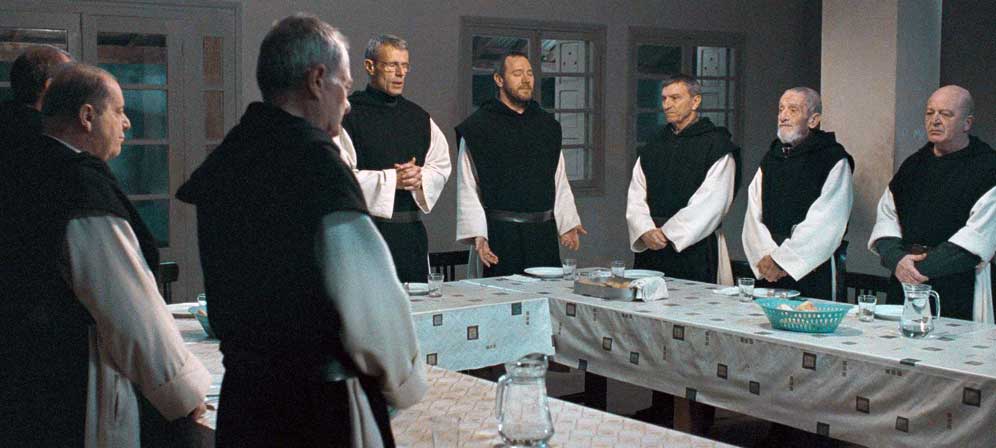
Of Gods and Men (2010)
Xavier Beauvois’ sublime Of Gods and Men is that almost unheard-of film that you do not judge—it judges you. To one degree or another it defies every attempt to put it in a box, to reduce its challenge to a political or pious ideological stance to be affirmed or critiqued.
Rabbit Hole (2010)
Kidman and Eckhart embody Becca and Howie with such unforced ease, interacting so naturally in both relaxed and tense moments, that they seem to be not so much playing characters as playing a relationship — a fragile, troubled marriage with a long history, in which more is unsaid than said.
Hereafter (2010)
Hereafter is demeaning both to believers and to unbelievers, and for the same reason: It stacks the deck too heavily in one direction. “The evidence is irrefutable,” a researcher tells TV journalist Marie Lelay (Cécile de France), dropping a sheaf of documentation on life-after-death experiences in her lap. “The X-Files” told us that the truth was out there, but Mulder and Scully never had it this easy.
The Social Network (2010)
“Every creation myth needs a devil,” a sympathetic attorney tells Mark Zuckerberg, co-founder of Facebook, in the last scene of David Fincher’s dazzling, engrossing The Social Network. It’s a slyly subversive line, simultaneously summing up and calling into question much of the interpretation of events we’ve seen over the last two hours — and it gains another twist when you know that the line was neither dreamed up by screenwriter Aaron Sorkin nor copied from life, but was first uttered by a Facebook executive after reading the screenplay. It’s a mashup of art and criticism — a fortuitously collaborative, revisionistic coda to a fictionalized account of the social media age.
Winter’s Bone (2010)
In a backwoods world in the Missouri Ozarks so harsh and unforgiving that it takes one’s breath away, Winter’s Bone finds a heroine who could not exist anywhere else.
Eat Pray Love (2010)
Americans have an abiding affinity for consumerist self-indulgence and for pop spirituality, and a marriage of the two is a winning combination. “God never slams a door in your face,” Gilbert writes, “without opening a box of Girl Scout cookies.” Yep, there’ll be no shortage of people eating that one up.
Get Low (2010)
Funerals are not for the dead, but for the living. The idea that this or that arrangement is what the deceased “would have wanted” may be consoling, but the consolation is ours, not theirs.
The Apostle (1997)
A sensitive cultural ethnography of the exotic, much-maligned world of Southern Pentecostalism; a complex study of a character whose many contradictions startlingly combine sacred and profane dimensions; a spiritual exploration of the inscrutable workings of guilt and grace: The Apostle—long labored over by writer, director, producer, and star Robert Duvall—is all of these.
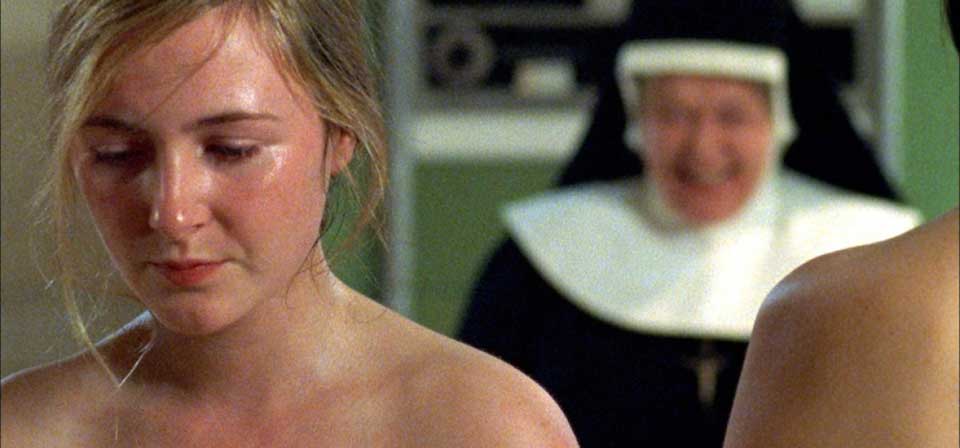
The Magdalene Sisters Controversy (2003)
That the Magdalene asylums represent a phenomenon as deserving of critical scrutiny as the trial of Joan of Arc or the ecclesiastical abandonment of the Guaraní missions, I don’t question. Mullan, however, betrays his subject with smug Catholic-bashing. It’s a tragedy that the enormity of what went wrong at the Magdalene asylums has been trivialized by cheap manipulation.
The Blind Side (2009)
Leigh Anne Tuohy (Sandra Bullock) is a red-state, family-values, guns-and-religion Erin Brockovich. Righteous, indomitable, unflappable, glamorous in plunging necklines and thigh-hugging skirts, she’s also a pistol-packing mama, a happily married homemaker and mother of two, a Bible-belt Evangelical and a dyed-in-the-wool gridiron junkie. She isn’t crass like Julia Roberts’ Oscar-winning part, but she’s as blunt and direct as an offensive tackle, and about as apt to be cowed by other people’s crass or intimidating behavior.
Crazy Heart (2009)
Crazy Heart’s turning point becomes a moment of clarity not only for Bad, but for Jean as well. It’s a film that is more hopeful and redemptive than its characters have a right to be, but along with hope is awareness of potentially irrevocable consequences.
Bright Star (2009)
Luminous, exquisitely acted and not without a sense of humor, Jane Campion’s Bright Star contemplates how this graceful, stylish, ignorant, sharp-tongued girl ensnared, and was ensnared by, a struggling young Romantic poet with no income and no critical acclaim.
Roma, città aperta [Open City] (1945)
Developed in Rome during the Nazi occupation, shot in the Eternal City shortly after the Nazi withdrawal, Roberto Rossellini’s Rome Open City stunned audiences the world over who saw in it an unmediated authenticity more evocative of the documentary quality of wartime newsreels than of the artificiality of earlier, more conventional WWII dramas.
Creation (2009)
Where is the other side of the debate? Where is the Darwin who declared it “absurd to doubt that a man might be an ardent theist and an evolutionist”? Where are the likes of Charles Kingsley and Asa Gray — representatives of, respectively, religion and science, who saw no quarrel between their two worlds, and both of whom Darwin cited in this connection? Where, indeed, is the Reverend Innes who vouched that his friend Darwin “follows his own course as a Naturalist and leaves Moses to take care of himself”?
The Young Victoria (2009)
Jean-Marc Vallée’s The Young Victoria is frothy, spirited and fairly inconsequential. I like that about it.
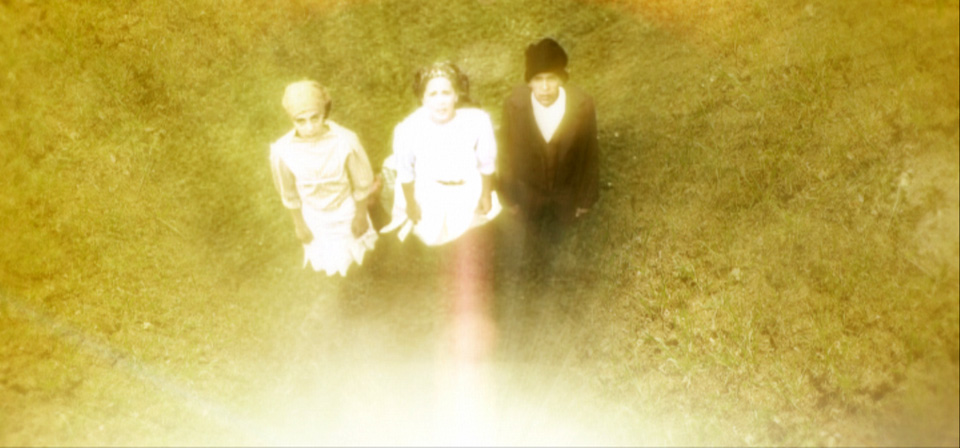
The 13th Day (2009)
The 13th Day is the best movie ever made about Fátima — the most beautiful and effective, as well as one of the most historically accurate.
Amelia (2009)
The press called her a “lady pilot,” but Amelia Earhart called herself a “tramp flyer.” She seems to have preferred “flyer” to “pilot”; perhaps it was just a manner of speech, or perhaps it was the sky she cared about more than the airplane, the act of flying rather than the mechanics of manning an aircraft. The other word she liked was “vagabonding.” As imagined in Amelia, Mira Nair’s handsome biopic, Earhart craves freedom above all: “no borders, only horizons.”
The Informant! (2009)
Each of us would like to think that, in such situations as the movie poses, we would do the right thing; in moments of crisis, we tell ourselves that that is what we have done. The Informant! confronts us with the inveterate human capacity for self-justification and self-deception, and the extent to which we are all prone to casting ourselves as the hero of our own drama and the victim of our own tragedy.
Summer Hours (2008)
French director Olivier Assayas’s Summer Hours opens with a glimpse into a world that has already passed away, though not all the characters realize it yet.
The Soloist (2009)
The Soloist is a story about a relationship across a socioeconomic chasm. Steve Lopez (Robert Downey Jr.) and Nathaniel Ayers (Jamie Foxx) have absolutely nothing in common, unless you count a propensity for stringing words together — which doesn’t count, because Lopez gets paid for it by the Los Angeles Times, while Ayers’ disjointed, rambling volubility is largely incomprehensible.
The Lucky Ones (2008)
After running through some pretty contrived paces for much of its running time, The Lucky Ones has some surprises in the last act that ultimately make it more satisfying than it might have been. Honor, sacrifice, and loyalty do count for something, and tough decisions characters thought they would never make turn out to be thinkable after all.
Brideshead Revisited (2008)
Yet this Brideshead Revisited ultimately subverts Waugh’s subtlest and most subversive achievement: It offers all the foibles and puzzlement of the Flytes’ religious world, while all but obliterating the threads of grace running through their lives.
The Dark Knight (2008)
So deeply does The Dark Knight delve into the darkness that lurks in the hearts of men that it comes almost as a shock, bordering on euphoria, to find that it maintains a tenacious grip onto hope in the human potential for good.
Son of Rambow (2008)
After making his feature debut with the rather inspiration-challenged big-screen Hitchhiker’s Guide to the Galaxy, director Garth Jennings wisely shifts to a more intimate and personal canvas with Son of Rambow, a quirky British indie, set in the early 1980s, that made a splash at Sundance. Although somewhat scattered and uneven, Rambow has enough heart and wit to sustain its 96-minute running time.
4 Months, 3 Weeks and 2 Days (2007)
4 Months, like previous Romanian export The Death of Mr. Lazarescu, compels us not to avert our eyes. Even though the actual events remain out of sight — apart from a single, indelible shot not unlike images seen in some types of pro-life materials — its confrontation of the unmentionable is no less devastating.
Amazing Grace (2006)
The title reflects the supporting role of John Newton, played with gusto by Albert Finney, as a penitent ex-slave ship captain, now a mentor of sorts to Wilberforce as well as the writer of the beloved American hymn. (“A wretch like me,” Newton was not afraid to call himself in the original lyrics, with a biographical and theological honesty too direct for the revisionist vandals of hymnody responsible for many missalettes and hymnbooks.)
Bella (2006)
In the end, Bella has something to challenge everyone, pro-life or otherwise. For pro-lifers, the inspiring ending represents a call to love of neighbor. It isn’t enough just to oppose abortion: We are called to love those in need with the love of Christ, potentially at a cost to ourselves. For those who favor abortion, the ending represents a challenge to recognize that life is a beautiful and precious gift even in far from ideal circumstances, and the choice to embrace life, even when it involves great sacrifice, is also beautiful.
Things We Lost in the Fire (2007)
Though not always faithful in small things, Things We Lost is faithful in much. The individual moments are sometimes off, but the large emotional resonances are right.
Elizabeth: The Golden Age (2007)
A lurid sort of Christopher Hitchens vision of history pervades Elizabeth: The Golden Age, Shekhar Kapur’s sequel to his 1998 art-house hit Elizabeth.
Trade (2007)
Trade needed to be the United 93 of the human trafficking crisis. It’s closer to being the World Trade Center.
The Assassination of Jesse James by the Coward Robert Ford (2007)
The Assassination of Jesse James by the Coward Robert Ford is the best name for a western of any film in history. It’s the second half of the title that does it — the editorial moralizing, redolent of a 19th-century dime novel or monograph. The kind of thing that boys like young Bob Ford eagerly devoured in their beds at night as they dreamed of being daring and admired like Jesse James.
Longford (2006)
Though thematically similar to Dead Man Walking, Longford grapples more directly and thoughtfully with religious themes, and doesn’t glorify its eccentric, somewhat tragic protagonist the way Dead Man Walking extols Sister Préjean.
Bridge to Terabithia (2007)
As with Walden’s recent Charlotte’s Web, the key points of the book are here, for the most part, but hampered by irrelevant “family film” clutter — in this case unmagical fantasy sequences jarringly at odds with the story’s most significant plot point.
The Namesake (2007)
At the end of its 122 minutes, perhaps, few if any of the story’s various partial threads have really been resolved. Open-ended and somewhat scattered, The Namesake is generally engaging but feels elusively incomplete. One could say it is about the journey rather than the destination. A more disciplined approach to the screenplay might have distilled Lahiri’s 300-page novel into something more satisfyingly focused. Instead, frequent Nair collaborator Sooni Taraporevala chooses to sketch in and gesture at as much of the book as possible, trusting viewers to supply the rest.
Beyond the Gates (2005)
Beyond the Gates is most worth seeing for its uncompromising portrait of a more representative episode in the Rwandan genocide than the events depicted in Hotel Rwanda. At the same time, it offers little insight into the Hutu or Tutsi experience.
The Astronaut Farmer (2007)
Like the full-sized rocket in Charlie’s barn, the Polishes’ film looks every inch what it seems to be. It’s been compared to a Frank Capra film, though it lacks the dark undercurrent and comedic edge that give Capra’s films their heft and stature.
Riding Alone for Thousands of Miles (2005)
The themes are timeless and humane, and if the film isn’t always entirely persuasive, it earns enough viewer goodwill to make up the difference. Funny, visually sumptuous, and bittersweet, Riding Alone movingly suggests that it’s better not to.
Hollywoodland (2006)
Just as real tragedy requires some sort of greatness, and real blasphemy presupposes some real sense of the sacred, so the iconoclastic depends on the iconic. Hollywoodland portrays a man so thoroughly trivial, so shallow and small, that it’s hard to see why anyone would want to make a movie about him, or watch one.
We Are Marshall (2006)
More than most films of its ilk, We Are Marshall rises above the clichés that define the genre, connecting sport to larger issues in an emotionally satisfying way.
Flags of Our Fathers (2006)
Even today, the iconic, Pulitzer-winning 1945 photograph of five US Marines and a Navy corpman raising the American flag on Iwo Jima retains an extraordinary power. Like a Norman Rockwell painting, Joe Rosenthal’s famous photograph tells a story, creates a mood, evokes an ethos, and elicits a metaphorical or allegorical response, all at the same time.
Facing the Giants (2006)
With fans of its two genres, especially in the Bible Belt, Facing the Giants will doubtless be a success. To reach a broader audience, though, the filmmakers will have to scrap their playbook and learn a whole new set of rules.
The Illusionist (2006)
A moody, atmospheric fairy tale, The Illusionist is the story of one illusionist — Eisenheim, a fictional turn-of-the-last-century magician — being told by another, writer-director Neil Burger ( Interview with the Assassin).
World Trade Center (2006)
Where Paul Greengrass’s brilliant United 93 crafted a documentary-like anatomy of events without presuming to get inside people’s heads or explain actions or motivations, World Trade Center is a more conventional Hollywood film, with dramatic dialogue, characters following clearly plotted arcs, and a swelling soundtrack to reinforce the mood.
Key Largo (1948)
Like the similarly sweaty, claustrophobic 12 Angry Men nine years later, John Huston’s Key Largo is a rare adaptation of a stage play in which the physical constraints of the stagebound source material are a strength rather than a weakness.
To Have and Have Not (1944)
Howard Hawks’s more or less in-name-only adaptation of Ernest Hemingway’s “worst novel,” has more in common with Casablanca (including nearly half a dozen players) than with its ostensible source material. Its real claim to fame, though, is the first pairing of Humphrey Bogart and Lauren Bacall, who appeared together in only three other films but remained ever after linked off the screen.
Lady in the Water (2006)
Why, I haven’t come across a fairy-tale premise calling for such childlike wonder and acceptance since the taxation of trade routes was in dispute and the greedy Trade Federation set up a blockade around the planet Naboo.
The Keys of the Kingdom (1944)
Gregory Peck’s star-making turn as Father Francis Chisom in John M. Stahl’s The Keys of the Kingdom earned him a Best Actor nod and established his screen persona as a ruggedly decent, dignified underdog.
X-Men: The Last Stand (2006)
Expressions like “Good things come in threes” and “Third time’s the charm” may have their place in the world, but when it comes to comic-book movies, so far at least, anything after two is all downhill.
Hoot (2006)
Alas, lightning has not struck twice. The similarities between Holes and Hoot only serve to underscore how far short the latter falls from the high standard set by the former.
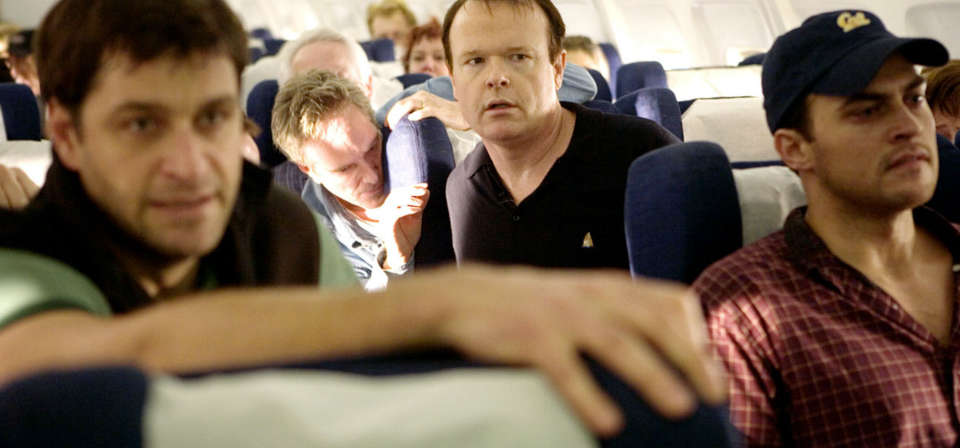
United 93 (2006)
Whatever monument is eventually built at Ground Zero or anywhere else, United 93 is as fitting and worthy a memorial to the victims and heroes of September 11 as one could hope for.
The Passion of Bernadette (1989)
Given the inherently less dramatic structure, The Passion of Bernadette doesn’t “tell a story” the way the original film does, but the portrait of Bernadette’s unassuming heroic sanctity and occasional tart rejoinders remains moving and worthwhile.
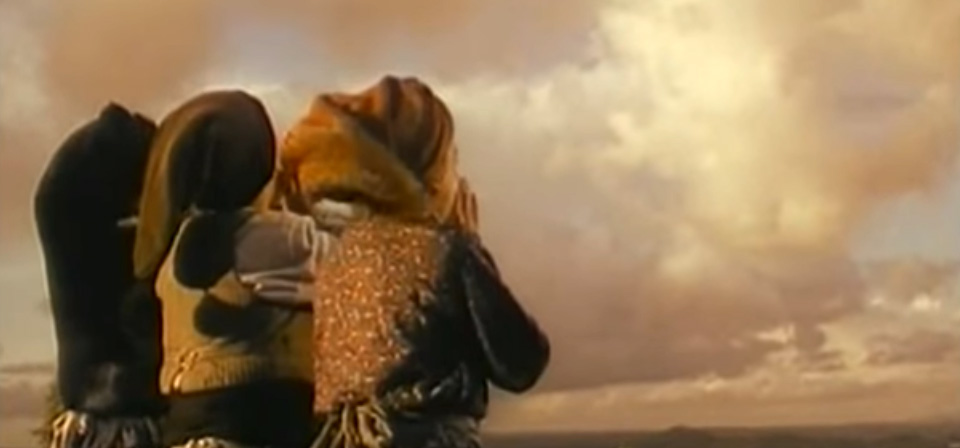
Apparitions at Fatima (1992)
Warner Bros’ The Miracle of Our Lady of Fatima may be better known, but Daniel Costelle’s 1992 Portuguese production Apparitions at Fatima is a more historically accurate and spiritually sensitive account of the visionary experiences of three young Portuguese children in 1917, culminating in the miracle of the sun witnessed by thousands.
The Shoes of the Fisherman (1968)
Fascinating despite flaws, The Shoes of the Fisherman is impossible to watch first of all as a movie. By a strange twist of chance or fate, it demands to be viewed as a curious, at times almost prescient anticipation of the reign of John Paul II, filtered partly through the lens of the Silly Sixties.
The Nun’s Story (1959)
The Nun’s Story certainly doesn’t offer the positive depiction of religious life common in 1950s Hollywood, but it’s not an anti-religious or anti-Catholic depiction either.
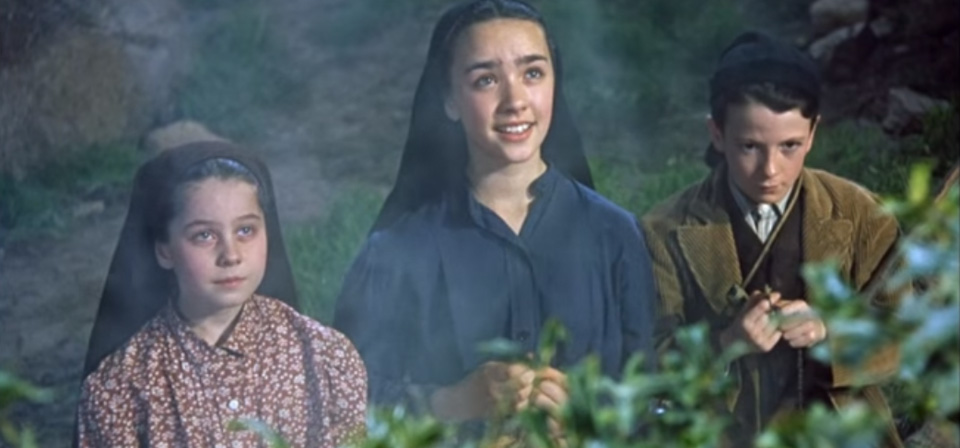
The Miracle of Our Lady of Fatima (1952)
Old-fashioned, reverent, basically faithful to the facts, The Miracle of Our Lady of Fatima never quite emerges from the shadow of the earlier, superior The Song of Bernadette, but it ups the ante with sterner opposition (militant Marxists rather than freethinking civil authorities) and a more dramatic climax.
Pride & Prejudice (2005)
This is no slight to the BBC miniseries; its glory is precisely its wonderfully literary quality. By contrast, the 2005 film is wonderfully non-literary. The BBC miniseries is peopled with living, breathing characters; the 2005 film is peopled with living breathing human beings. This is not to diminish the definitive achievement of the BBC miniseries, but to appreciate the freshness of a retelling that does something new.
The Ten Commandments (1956)
For good and for ill, it’s as much a testament and a fixture of traditional American ideals and affections as a courthouse display of the stone tablets, and as weighty and solid.
Crash (2005)
Crash is a provocation, an insistent manifesto that filters every scene and almost every line of dialogue through the prism of race, but keeps turning the prism around and around until the colors no longer matter and we see only what the characters do.
The Prize Winner of Defiance, Ohio (2005)
The ongoing Hollywood deconstruction of Eisenhower-era American values hits a speed bump of sorts in The Prize Winner of Defiance, Ohio, a whimsical, stylish tribute to the wit and inner strength of a Donna Reed–esque housewife and mother of ten (Julianne Moore) whose bouyancy and creative flair holds her family together in spite of little help and indeed much resistance from her alcoholic, bullying husband (Woody Harrelson).
Tsotsi (2005)
Tsotsi seems almost entirely severed from human values, and his seemingly total moral apathy rattles the conscience-stricken Boston. “Decency, Tsosti,” Boston harangues. “Do you know the word?”
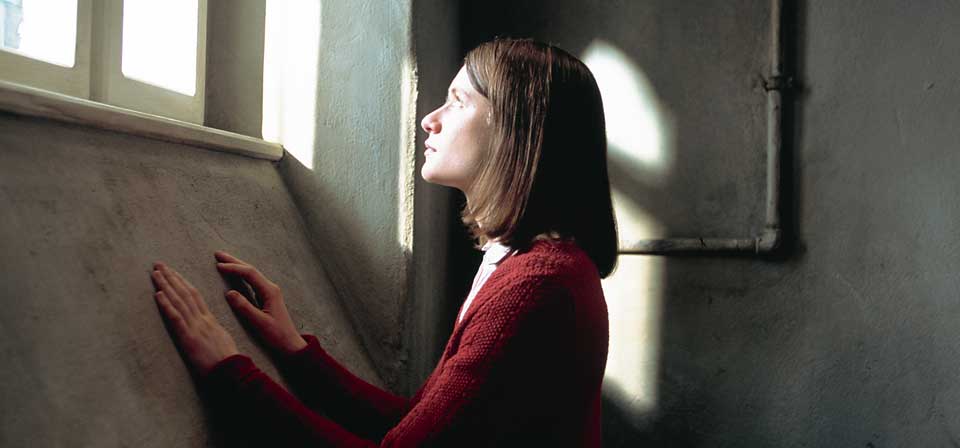
Sophie Scholl – The Final Days (2005)
Sophie Scholl is one of a very few films that accomplishes one of the rarest and most valuable of cinematic achievements: It makes heroic goodness not just admirable, but attractive and interesting.
Eight Below (2006)
If Snow Dogs is a fairly typical example of the conventional Hollywood idea of a live-action family film, Eight Below is a typical example of a new trend in family films that includes National Treasure, Hidalgo, Two Brothers, Fantastic Four and The Legend of Zorro. This is a good thing, but not yet good enough.
Young Mr. Lincoln (1939)
Henry Fonda’s best-known performance as a legendary historical character in a John Ford film is, of course, as Wyatt Earp in My Darling Clementine. Yet Fonda was more aptly cast, and gives a more vivid performance, five years earlier in their lesser-known first collaboration, Young Mr. Lincoln.
The New World (2006)
Up to a point, there is a level of artistic kinship between The New World, Terence Malick’s dreamlike origin myth of the American colonies, and another recent, visually poetic meditation on a foundation story: Mel Gibson’s The Passion of the Christ.
Match Point (2005)
The first shot in Woody Allen’s Match Point is meant to serve as a metaphorical master-image for the film as a whole: a freeze-frame shot of a tennis ball suspended in space over the net after striking it, poised between falling on one side of the net or the other.
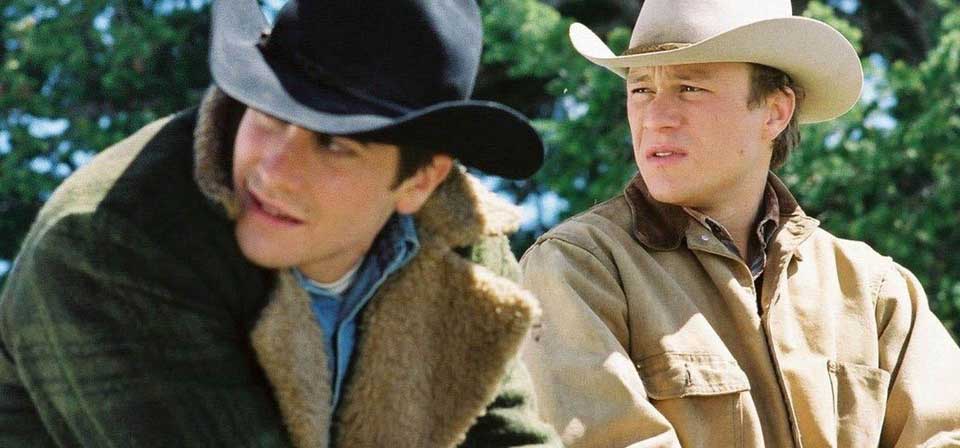
Brokeback Mountain (2005)
In the end, in its easygoing, nonpolemical way, Brokeback Mountain is nothing less than an indictment not just of heterosexism but of masculinity itself.
Pickpocket (1959)
Does Michel want to be caught? Does he taunt the inspector because he feels untouchable, or is there another reason? As always, Bresson examines actions but offers little attention to motives, an approach that here seems to suggest that Michel’s choices may be a mystery even to himself, his threadbare theorizing only rationalization.
Apollo 13 (1995)
In an age when we rely on computerized directions and GPS devices to drive to the next town, it seems an almost mythic scenario: brilliant men calculating outer-space trajectories on the fly with pencils and slide rules, keeping life and limb together literally with duct tape, flying to the moon and back simply because they could.
Jaws (1975)
Steven Spielberg’s breakout hit is a perfect storm of primal fears (man-eating predators, the unseen, the ocean), shrewd, emotionally riveting direction combined with sympathetic lead performances, and that classic two-note theme from John Williams’ edgy score.
A Night to Remember (1958)
Based on the 1955 bestseller by Walter Lord, Roy Ward Baker’s 1958 British-made docudrama A Night to Remember remains the clearest, most honorable cinematic depiction of the Titanic disaster, easily eclipsing the earlier 1953 Hollywood melodrama Titanic as well as the much later blockbuster of that same name by James Cameron.
Batman (1989)
Critics adored Batman for its eccentric, Burtonesque take on a pop-culture icon, for its moody, noirish gothic art-deco Gotham City, and of course for Jack Nicholson’s showy performance as the Joker. Comic-book fans, meanwhile, appreciated the film for rescuing the Dark Knight from the over-the-top camp comedy of the 1960s series and making him suitably dark and brooding. For all that, though, the film’s flaws are hard to overlook.
The Karate Kid (1984)
Ralph Macchio stars in what is still his signature role as Daniel LaRusso, a sensitive lad reared in the nurturing enclaves of Newark, New Jersey who finds the harsh realities of life in southern California a bit overwhelming after he move across country with his single mother (Randee Heller), who’s just taken a new job.
The Truman Show (1998)
Peter Weir’s The Truman Show is a remarkably layered achievement: a deceptively simple fairy tale; a hilariously subversive satire of media excess and the erosion of privacy; a sly exploration of the paranoid, solipsistic fear that the world around one is somehow staged for one’s benefit and everyone else is in on it; and finally an elegant parable about truth and happiness with evocative religious resonances.
The Miracle Worker (1962)
Beautiful black-and-white cinematography, startling performances, and harrowing physicality make The Miracle Worker an extraordinary experience.
The Exorcism of Emily Rose (2005)
A line in the trailer for The Exorcism of Emily Rose, felicitously cut from the final film, observes that “There’s no pill for the devil.” More to the point, there’s no diagnostic test or scan for him, either.
Sometimes in April (2005)
Compared to the theatrically released Hotel Rwanda, Sometimes in April is grimmer, less focused, and more uncompromising. Both films focus on a connected, successful Hutu family man with a Tutsi wife and a number of children, but this man’s story, in which the past of 1994 and the present are intercut, is more ambiguous and tragic.
The Return (2003)
Echoes of Abraham and Isaac, the Gospel parables about fathers and pairs of sons, and the Second Coming run through a stark tale of an inscrutable, harsh stranger whose unexpected reappearance in the lives of his two sons is as unexplained as his disappearance so many years earlier. Our first glimpse of the nameless father (Vladimir Garin) lying in bed overtly recalls Mantegna’s Lamentation Over the Dead Christ — yet this man is anything but Christlike in his treatment of his newfound sons.
Judgment at Nuremberg (1961)
Downbeat, intelligent, and compelling, the film is brilliantly constructed and acted, bringing lucid, forceful moral argumentation as well as emotional sympathy to both sides without tipping its hand until the powerful climax. Tribunal justice Dan Hayward (Spencer Tracy) is the ideal foil for the film’s rhetoric: a self-deprecating, folksy American circuit court judge with no ax to grind and a winsome appreciation for his own obscurity, knowing he’s sitting in judgment of defendants no one else wanted to judge.
Lancelot of the Lake (1974)
More, it is a tale of fellowship undone not first of all by the treachery of enemies but by the frailty of human nature itself, even of the most trusted intimates. Perhaps that’s partly why classic Hollywood forayed more successfully into Sherwood Forest and Zorro’s California than Camelot.
Au Hasard Balthazar (1966)
A stark, unsettling vision of human cruelty, folly, and destructive behavior, leavened by an icon of innocent suffering, Au Hasard Balthazar may be Robert Bresson’s most poetic, haunting, personal work — the culmination of the filmmaker’s style and concerns, the most "Bressonian" of films.
Charlie and the Chocolate Factory (2005)
Tim Burton’s Charlie and the Chocolate Factory is enough to make any fan of Roald Dahl’s most beloved novel cry — with delight at all the film gets so magically right, and with frustration that in spite of that the film is still nearly ruined by Burton’s obsessions and a spectacularly miscalculated performance by star Johnny Depp.
Cinderella Man (2005)
Here Crowe overturns another Hollywood convention in an equally strong performance as a boxer who isn’t a morally checkered, socially alienated single man with a history of extracurricular violence and troubling relationship issues (cf. Rocky, Raging Bull, The Boxer), but a wholly decent, self-controlled, devoted family man. He’s not only Cinderella, he’s Prince Charming too.
The Ninth Day (2004)
The Ninth Day digs beyond rote charges of ecclesiastical complicity and counter-arguments to explore various levels of resistance and protest — and their consequences.
Hotel Rwanda (2004)
Not in the now-distant mythology of World War II, with the iconic evil of the Nazi regime pitted against the warriors of the Greatest Generation, or even the likes of larger-than-life Oskar Schindler. Here is a horror within living memory of nearly anyone old enough to watch the film, a holocaust without the cover of a massive bureaucratic machine or industrialized, sanitized gas chambers.
The Jeweller’s Shop (1990)
The story is propelled by ordinary (though sometimes philosophically elevated) dialogue, and a mysterious character in the play, Adam, becomes a simple priest — a rather Wojtyla-like priest, actually, who takes the young people of his parish on nature hikes in the mountains.
Faustina (1995)
Without context or explanation, Lukaszewicz plunges the viewer into Faustina’s world, confronting us with with an early experience from Faustina’s childhood, challenging us to take this story on its own terms. It’s a surprisingly powerful approach, as transcendent in its own way as the restraint of Bresson or Dreyer.
Ivanhoe (1952)
Director Richard Thorpe and star Robert Taylor would re-team the following year for the Arthurian epic Knights of the Round Table, but that film is a pale imitation of Ivanhoe, which boasts better spectacle and action (highlights include the opening tournament, the rousing seige sequence that is the film’s centerpiece, and a gripping climactic duel scored by ominous drums), a more interesting romantic triangle, and better villains scheming to usurp the king’s throne.
Ivanhoe (1982)
The best version is the 1982 TV movie starring Anthony Andrews (“A.D.”) as Ivanhoe, Olivia Hussey and James Mason (“Jesus of Nazareth”’s Virgin Mary and Joseph of Arimathea) as the Jewess Rebecca and her father Isaac of York, and Sam Neill (Jurassic Park), John Rhys-Davies (The Lord of the Rings), and Stuart Wilson (The Mask of Zorro) as villainous Norman knights.
Million Dollar Baby (2004)
By the film’s end, Frankie is faced with a choice that the priest says could lead to his damnation. The film makes the wrong choice seem right. But it leaves it an open question, I think, whether making that choice leads to redemption or damnation. Million Dollar Baby suggests, perhaps, that the right and most loving thing to do for someone else may entail one’s own damnation. This is very far from good way of looking at things. But it suggests a film that is less complacent, more thoughtful, less like smug propaganda than some of its detractors allege.
Bernadette (1988)
Eschewing both the slickness and Hollywood sentiment of The Song of Bernadette and the speculative psychology of Alain Cavalier’s contemporary Thérèse, Delannoy’s unembellished, straightforward account seeks only to tell Bernadette’s story in a clear and compelling way.
Ladder 49 (2004)
A strongly Catholic milieu is a mixed blessing. On the one hand, there are church weddings, baptisms, funerals, and Christmas Masses. On the other hand, the hero and heroine (Jacinda Barrett), who will later marry and have children, wind up in bed after a night of heavy drinking, and a borderline sacrilegious hazing stunt simulates the sacrament of penance. Ladder 49 doesn’t ask us to accept its characters as saints, but it does argue that, whatever their faults, they deserve to be honored as heroes.
Millions (2005)
Millions is a rare and special family film: a moral parable rather than a morality tale; a film that combines high ideals and hard realities; a story of hope and faith in something more than Santa Claus. Which is not to say that Santa Claus, or rather St. Nicholas, doesn’t show up. But when he pops on a bishop’s mitre rather than the familiar red Santa hat, it’s clear we’re not in Hollywood movieland here.
The Gospel of John (2003)
It is, so to speak, not "based on" St. John’s Gospel at all, so much as it is St. John’s Gospel — visualized and enacted to be sure, and to that extent interpreted and glossed, but not "adapted" in the usual sense.
Hoosiers (1986)
Hoosiers is more than a sports film — it’s a rousing story of redemption that cares deeply enough and is knowledgeable enough about the game to thrill the most demanding devotee, yet also cares deeply enough about its characters and larger themes that they matter in themselves, and aren’t just there for the sake of the game.
Because of Winn-Dixie (2005)
Faithfully adapted from the popular Newbery Honor novel by Kate DiCamillo, Because of Winn-Dixie is a good family film frequently verging on being an excellent one, and is quite a bit better than the dog-movie clichés suggested by the trailers.
Stalag 17 (1953)
Grimly hilarious, subversive and defiant, rough around the edges, and more than a little sad, Billy Wilder’s Stalag 17 may have been the inspiration for TV’s “Hogan’s Heroes,” but this is no campy farce.
Twilight Samurai (2002)
Seibei hardly cuts a dashing figure; even his weapon of choice, the short sword, provokes contempt rather than respect. But his duties these days call for clerical work rather than swordplay — until his best friend Iinuma (Mitsuru Fukikoshi) is threatened by a former brother-in-law, the ex-husband of Iinuma’s beautiful sister Tomoe (Rie Miyazawa), whom Seibei’s known since childhood.
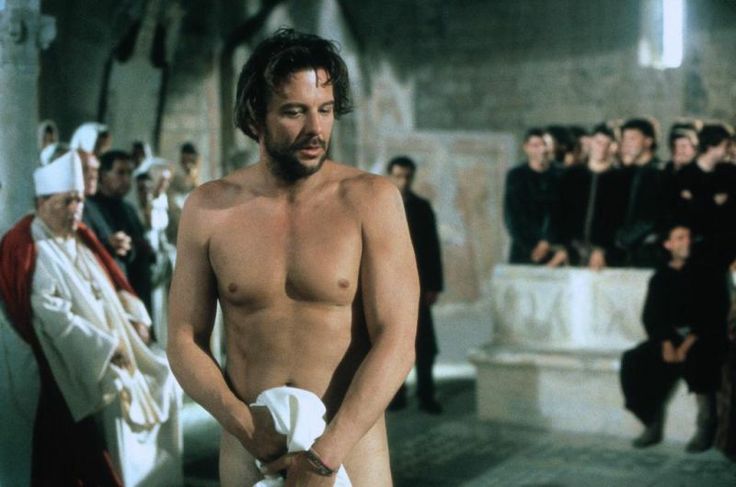
Francesco (1989)
How is it, then, that Cavani succeeds in making Francesco neither an attractive hero of secular virtues nor an off-putting champion of spiritual ones? How does she come to make her protagonist off-putting without being otherworldly, earthbound without being attractive?
The Aviator (2004)
You can almost feel Martin Scorsese exorcising the specter of Gangs of New York in the first act of The Aviator, another leisurely two-hour, forty-five-minute exercise in lavish period Americana starring Leonardo DiCaprio.
Ordet (1955)
Ordet means "the word," but what is the word? What is Carl Dreyer’s somber, ponderous masterpiece, adapted from the stage play by Lutheran clergyman Kaj Munk, really about?
Chariots of Fire (1981)
Two very different approaches to religion and sport are at the heart of Chariots of Fire, a period piece that explores timeless themes of temporal ambitions and higher purposes, of commitment and sacrifice, of ability and spirit.
In Good Company (2004)
It’s not without faults. At times the satire crosses over into silly farce, and, while the last act avoids the most obvious clichés, it’s still a bit tidy. And some of the film’s basic themes seem undermined by an unfortunate subplot involving perplexing decisions by more than one character. But if these faults can’t quite be overlooked, the film’s virtues are rare enough to make the whole package worthwhile.
Thérèse [The Story of Saint Thérèse of Lisieux] (2004)
“Ordinary girl. Extraordinary soul” is the tagline of Thérèse, Catholic actor-director Leonardo Defilippis’s reverent, uplifting, straightforward biopic of the Little Flower. Of the tagline’s two clauses, the film’s special burden seems to be the first part, “ordinary girl.”
The Kinsey controversy
The life and work of Dr. Alfred C. Kinsey, the Indiana University entomologist turned pioneering sexologist, has provoked accounts and interpretations as divergent, and as bitterly contested, as John Kerry’s Vietnam service in the last election. And, while it’s true that Kinsey’s work warrants such scrutiny, it’s also true that this only makes the task of weeding through the arguments more daunting.
Au Revoir Les Enfants (1987)
Au Revoir Les Enfants, Louis Malle’s semi-autobiographical film about life in a Catholic boarding school for boys in Nazi-occupied France, has been called an elegy of innocence lost, though in fact the youthful characters are never truly innocent, only clueless, and what they lose is not innocence but something more elusive.
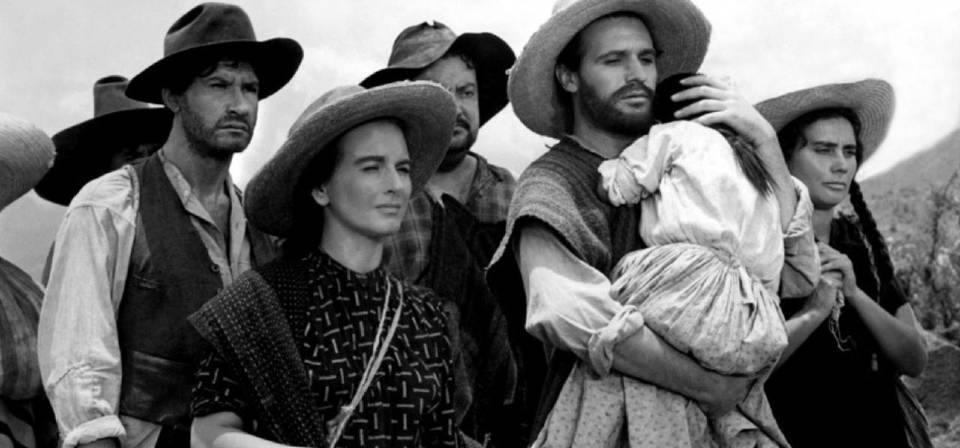
Nazarín (1959)
Buñuel makes his case against faith, not by attacking its foolish or corrupt practitioners, but by arguing that the thing itself, even when lived almost to perfection by a near saint, is moot, even harmful. It may be the most breathtaking cinematic cross-examination of faith I have ever seen.
Flight of the Phoenix (2004)
This provocative comeuppance for can-do American spirit is thrown to the winds in the remake, which from the outset establishes pilot Frank Towns (Dennis Quaid) and his co-pilot A.J. (Tyrese Gibson in the Attenborough role) as bullying, swaggering creeps with no redeeming traits who exist in order to be taught a lesson. They’re gratuitously abusive to the ragtag team of abruptly unemployed oil-riggers they’ve come to evacuate. Their arrogant repartee in the opening minutes is so full of leering sexist humor (Frank’s the sort of guy who can’t even buckle his seat belt without making a lewd remark about it) that by the time A.J. observes of the massive sandstorm into which they’re flying, "That’s a big one, Frank," we can tell it must be serious, since Frank makes no crass response.
The Burmese Harp (1956)
Kon Ichikawa’s deeply humane, spiritually resonant masterpiece The Burmese Harp is routinely but reductionistically described as “pacifist” or “anti-war,” though in fact war is merely the occasion for the story’s theme, not the theme itself. That theme is nothing less than the intractable mystery of suffering and evil, an affirmation of spiritual values, and the challenge to live humanely in evil circumstances.
I Am David (2004)
Why has young David (Ben Tibber) spent most of his short life in a Bulgarian labor camp? He doesn’t know, and neither do we. As the title suggests, I Am David wants us to experience David’s story through the eyes of a young boy who has never known anything but this camp, except for a few flashbulb memories of a fair-haired woman he knew in another life.
The King of Kings (1927)
Cecil B. DeMille’s biblical silent masterpiece The King of Kings, until now available in home video only in DeMille’s shortened 112-minute 1928 cut, is now available in a new restored DVD edition from Criterion that includes both the original 155-minute 1927 “roadshow” version and the shorter general release version.
Wild Strawberries (1957)
For Bergman’s protagonist, an elderly doctor named Isak Borg (Victor Sjöström) who significantly shares Bergman’s initials, there is bitter as well as sweet in the fields of his mind. The film is a road trip that is also a journey of self-discovery as Borg is forced to confront his own coldness of heart and need for forgiveness.
The Searchers (1956)
The reputation of John Ford’s The Searchers as a classic but troubling Western in which John Wayne plays an Indian-hating racist is so widely accepted that it’s a bit of a surprise to discover that the film, and the character, are in fact more complex than the reputation suggests.
Old Yeller (1957)
"It’s not just a dog story," writes Annie Dingus in Texas Monthly, "it’s a rite of passage for American children." She is right. "Who saw Old Yeller?" Bill Murray asks a bunch of American soldiers in Stripes, trying to define our national spirit. "Who cried when Old Yeller got shot at the end? Nobody cried when Old Yeller got shot? I’m sure. I cried my eyes out!" And on NBC’s "Friends," ditsy Phoebe had a sudden unpleasant revelation as she realized that all her life her parents had always turned off the film before the climax, sparing her the film’s heartbreak — but also its life-affirming wisdom.
The Seventh Seal (1957)
Starkly existential, boldly poetic, slow and grim, Ingmar Bergman’s great classic The Seventh Seal has haunted film aficionados, baffled and bored college students, inspired innumerable parodists, and challenged both believers and unbelievers for nearly half a century.
Lassie Come Home (1943)
The obstacle to this duty, of course, is that Joe’s father Sam (Donald Crisp) is eventually forced out of financial necessity to sell Lassie to the wealthy Duke of Rudling (Nigel Bruce). However, Lassie twice escapes from the the duke’s disagreeable handler Hynes (J. Patrick O’Malley) in order to keep her appointment with Joe, and eventually the duke takes Lassie to an estate in Scotland, over a thousand miles from her home.
I Confess (1953)
Hitchcock’s underrated I Confess may or may not not quite rank with his greatest masterpieces, but it offers perhaps the most compelling variation on the director’s favorite theme, the innocent man wrongly accused.
La Strada (1954)
As yet, I have found no illumination in critical accolades and explanations. No critical account of La Strada I have read has struck me as compelling or illuminating. Pauline Kael famously wrote that the three main characters represent the flesh, the spirit, and the mind. But the same could be said for virtually any trinity of characters, from Lancelot, Arthur, and Guinevere to Kirk, Spock and McCoy to Mr. Toad, Mole, and Rat, and what light this paradigm sheds on this particular story is unclear to me. Alan Stone calls it "a parable about Italy under fascism and the possibility of Christian Salvation," but I can’t see that it has anything interesting to say about this either, or that it says it in an interesting way.
Miracle of Saint Thérèse (1952)
Joan of Arc, the warrior-saint who wore men’s garb and was burned at the stake, would at first glance seem to be an odd role model for a girl whose greatest aspiration was to wear the habit of a cloistered nun and who died in the convent of tuberculosis.
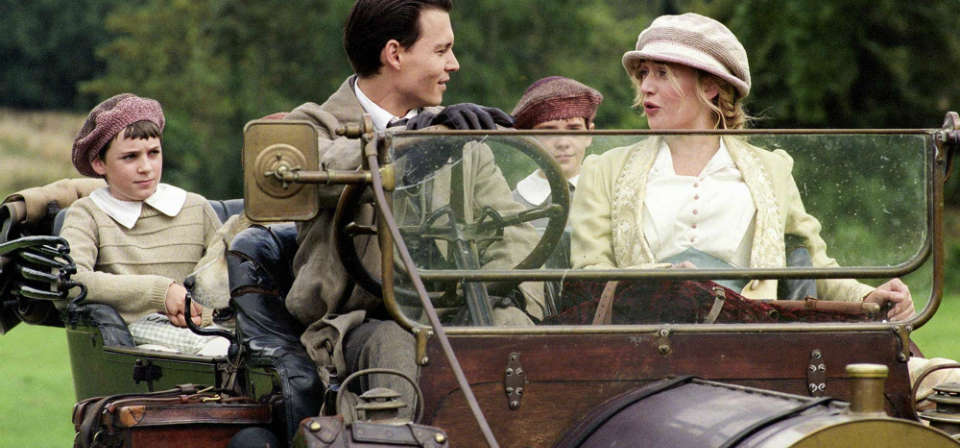
Finding Neverland (2004)
The film depicts Barrie coming into the Llewelyn Davies boys’ lives like Robin Williams into the lives of his students in Dead Poets Society. This isn’t a story about magical childhood soaring where no adult can follow, but about a magical adult imparting the gift of imagination to children.
8½ (1963)
Though more of a Fellini skeptic than not myself, I can’t go along with the common opinion that Fellini’s early neorealist-inflected works, culminating in La Strada, are his best, and that the later, increasingly surreal cinema of the gaudy and fantastical represented by 8½; is self-indulgently trivial by comparison.
The Sacrifice (1986)
To “rip open the inconsolable secret,” to awaken the spiritual hunger for something beyond the materialistic scope of our fragmented, desacrilized modern existence, was the burden of Andrei Tarkovsky, cinematic poet laureate of the Russian soul.
The Sixth Sense (1999)
A ubiquitous tagline and a mind-bending climactic twist made M. Night Shyamalan’s breakout hit The Sixth Sense a monster sensation — yet this deliberately paced, psychologically sensitive paranormal thriller is much more than a one-trick puzzle movie, and holds up well to multiple viewings.
Kiki’s Delivery Service (1989)
A loosely structured coming-of-age story, Kiki’s Delivery Service features one of Miyazaki’s most personable protagonists, a delightful cast of supporting characters, and a rambling, episodic storyline full of charming incident and irresistible imagery.
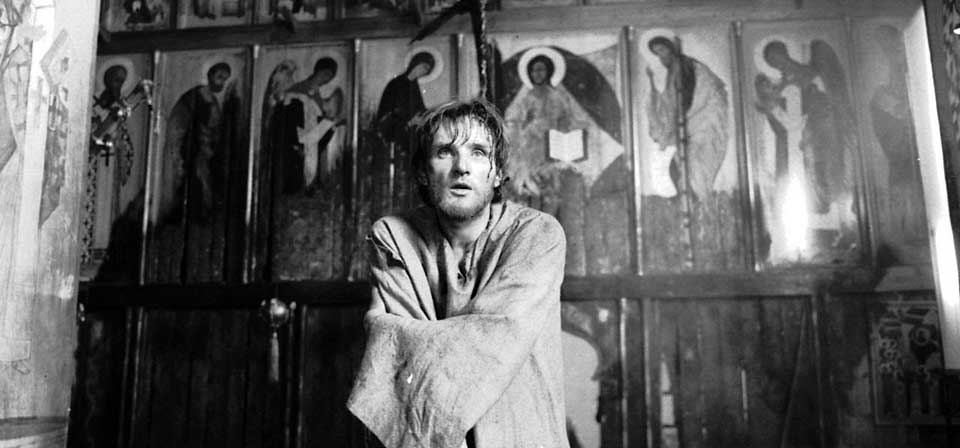
Andrei Rublev (1969)
The notion of art as a "religious experience" is sometimes bandied about too freely. Tarkovsky is one of a handful of filmmakers for whom this ideal was no cheap or desanctified metaphor, but literal truth.
Shall We Dance (2004)
In a society of rigid social codes and expectations that place more emphasis on duty than self-fulfillment and in which even holding hands between spouses is considered risqué, there is considerable intrigue in the protagonist’s unconventional, potentially profoundly embarrassing behavior.
Thérèse (1986)
Alain Cavallier’s stark, austere reflection on the mystery of the little saint of Lisieux’s romance with Jesus… is a reverie rather than a meditation, built of fleeting minimalist vignettes, almost snapshots, glimpses of its subject rather than an integral portrait. There is no sense of judgment, of approval or disapproval of its subject’s life, or even, finally, of real understanding. His Thérèse is a riddle, and we must make of her what we can.
Touching the Void (2003)
Forget Cast Away. Forget Alive. Touching the Void, the true story of a pair of daredevil mountain climbers in the Peruvian Andes, may be the most harrowing, dazzling, haunting survival story ever filmed.
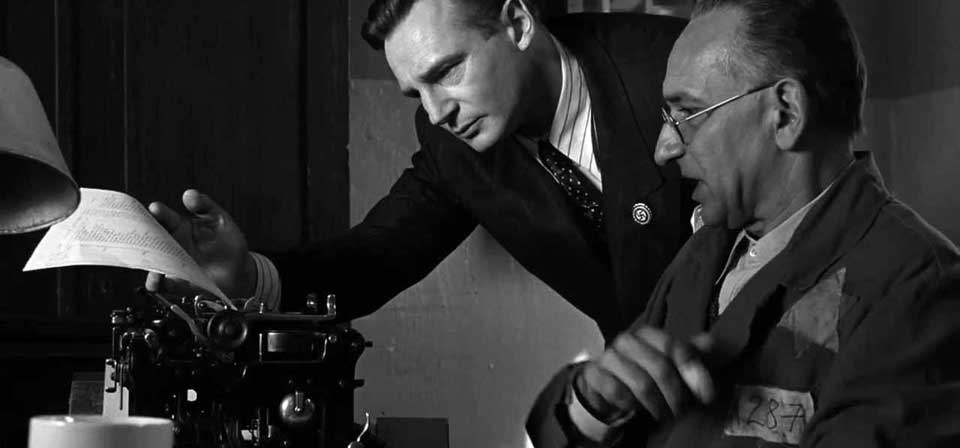
Schindler’s List (1993)
From the armbands to the ghettos, from forced labor to extermination camps and beyond, Schindler’s List covers the successive historical stages of the Final Solution more comprehensively than any other popular film had at the time, or has since. That, in part, is its great achievement — and, for many of its critics, its enduring stigma.
The Scarlet and the Black (1983)
Riveting and edifying, this WWII drama stars Gregory Peck as Msgr. Hugh O’Flaherty, a plain-speaking, straight-dealing Irish priest who boldly aids enemies of the Third Reich under the watchful eye of Christopher Plummer’s Nazi Lt. Col. Herbert Kappler. Their cat-and-mouse game is thrilling and great fun, and culminates in a startling showdown in a very significant setting.
Vanity Fair (2004)
Mira Nair’s Vanity Fair is many things, but a howl to a congregation of fools isn’t one of them.
The Tree of the Wooden Clogs (1978)
Critic Dave Kehr of the Chicago Reader calls The Tree of the Wooden Clogs "less an advance over the standard film festival peasant epic than an unusually accomplished rendition of it," and speaks of a "Marxist sentimentalism" inherent in its subject matter and approach. This seems to me misleading. Olmi’s film may be best thought of, not as an attempted advance over the typically Marxist neorealist peasant epic, but as a redemption of it.
Benji Off the Leash! (2004)
Benji Off the Leash is undoubtedly the first dog movie ever made that thinks that a happy ending for a boy and his dog is not for the boy to get to keep the dog, but for the dog to go off to Hollywood to make a motion picture.
Intolerance (1916)
Intolerance is a grandiose composite epic, interweaving four separate morality plays from different eras and settings, from 20th-century America (the "Modern Story") to Old Testament times (the "Babylonian Story"). Rounding out the four are a brief survey of the life and death of Christ (the "Galilean Story" [sic; most of it is set in Judea, not Galilee]) and events from the 16th-century persecution and massacre of Huguenot Protestants under the Medicis, including the St. Bartholomew’s Day Massacre (the "French Story").
The Birth of a Nation (1915)
Yet the film’s second half, with its outrageously racist stereotypes and view of the post-war reconstruction, incited protest even in its own day, and has only become more disturbing over time. Had Griffith concluded the film at the close of Part I with the stunning depiction of Lincoln’s assassination, controversy over the film would be a mere footnote. But there’s no ignoring the film’s final act, which, following the source novel and play The Clansmen by white supremacist Thomas F. Dixon Jr., celebrates the founding of the original Ku Klux Klan, climaxing with the Klan heroically subjugating out-of-control black rioters and restoring white control.
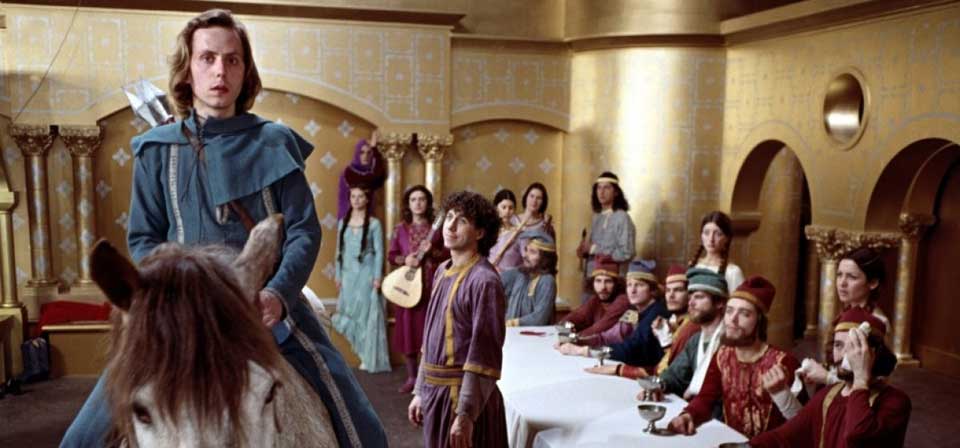
Perceval (1978)
The narration in verse has been set to music adapted from authentic medieval melodies, and is sung in the original old French by a chorus of minstrels playing traditional instruments, as well as by the players themselves. The players’ bright costumes and the overtly stagey sets — a grove of abstract sculpture-like trees for a forest; simple façade castles built of painted wood — were inspired by medieval paintings and illuminated manuscripts.
The Village (2004)
With The Village, Shyamalan has gone to the well once too often. Whether or not you see the anti-climactic twists coming is almost beside the point. For the first time, Shyamalan has created a puzzle movie populated by characters we can’t identify with, living in a world we can’t relate to. The viewer has no stake in this story; he comes to the Village a stranger in a strange land, and remains so through the course of the film.
A Man Escaped (1956)
As he did in his prior Diary of a Country Priest, Bresson faithfully adapts his source material, but he also appends a subtitle to A Man Escaped — The Wind Blows Where it Wills, an allusion to Jesus’ discourse in John 3 about being born of water and the Spirit — and rechristens the protagonist (whose real name was André Devigny, and is played by François Leterrier) “Fontaine,” fountain. Clearly, like Diary, A Man Escaped is intended as a reflection on spiritual bondage, rebirth, and the mysteries of grace and providence, as much as about stone walls and iron bars.
Metropolis (1927)
Surreal, sprawling, and operatic, drawing on biblical and medieval Christian imagery as well as H. G. Wells’s The Time Machine, Fritz Lang’s deeply influential pulp allegory Metropolis colonized a new realm of the imagination that has shaped subsequent science fiction from Flash Gordon to Star Wars, from "The Jetsons" to Blade Runner.
Gandhi (1982)
Overshadowing even Ben Kingsley’s astonishing, transcendent performance in his first major screen role is a larger, more formidable presence: that of Mohandas K. Gandhi himself.
City Lights (1931)
City Lights is the quintessential Chaplin film — both the most perfectly crafted and satisfying of all his films, and also the most representative of all the different textures and tones for which Chaplin is remembered, from slapstick and pantomime to pathos and sentiment, farce and irreverence to melodrama and social commentary.
Bobby Jones: Stroke of Genius (2004)
The most successful sports movies (recent examples include Miracle, 61*, and The Rookie (starring Caviezel’s Frequency costar Dennis Quaid), reach out across the divide separating fans from non-fans, finding ways of making the drama compelling to the uninitiated as well as aficionados. Bobby Jones, while sweetly sincere and uplifting, doesn’t fully succeed in doing this.
Two Brothers (2004)
Annaud’s skill and subtlety elevate what is essentially a simple, fable-like throwback to the sort of live-action feature Disney used to make in the 1950s.
The Decalogue (1988)
The Decalogue, Kieslowski’s extraordinary, challenging collection of ten one-hour films made for Polish television in the dying days of the Soviet Union, doesn’t answer those questions either. What it does is pose them as hauntingly and seriously as any cinematic effort in the last twenty years.
Dersu Uzala (1975)
Vladimir Arseniev was an early 20th-century explorer who mapped much of the krai territory of the Russian Far East and studied its indigenous peoples. Based on his memoirs, Akira Kurosawa’s Dersu Uzala tells the story of an unusual friendship between Arseniev (Yuri Solomin) and the nomadic tribal hunter for whom the film is named (Maksim Munzuk).
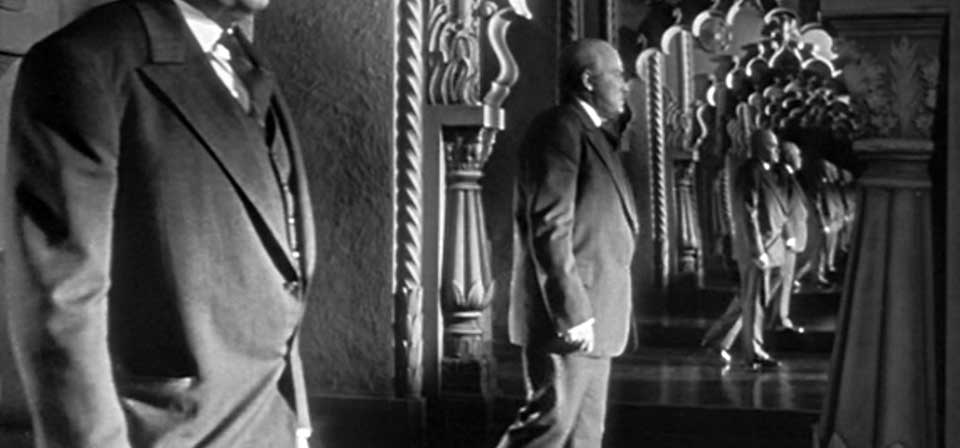
Citizen Kane (1941)
While working on Citizen Kane, Welles joked that "If they ever let me do a second picture, I’m lucky." He was only half right. He was lucky enough to make many additional pictures, some of them masterpieces in their own right. But the luckiest he ever got, which is more than lucky enough, was getting to make Citizen Kane itself. That unprecedented level of control and magical synergy was a once-in-a-lifetime opportunity — and, to his immortal credit, Welles made the most of it. He made Citizen Kane.
The Son (2002)
A tightly wound, middle-aged carpenter named Olivier (Olivier Gourmet) works with young boys at some sort of center. His inner life, his motives and emotions, aren’t revealed to us, and he doesn’t seem preoccupied with them himself. He wears a leather back brace, and has perhaps been injured at some point; and his work itself may be a similar sort of prop against some injury of his past.
On the Waterfront (1954)
“A Going My Way with substance” is how Elia Kazan’s classic, controversial On the Waterfront was recently described in a lecture at Boston College.
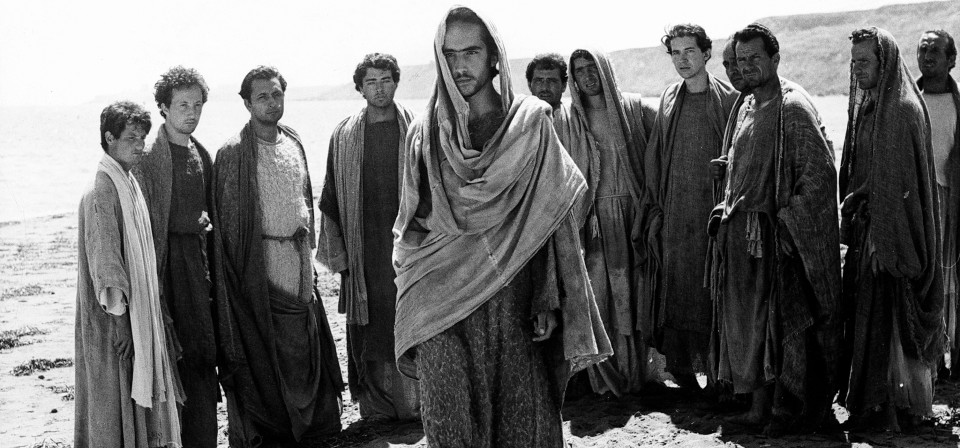
The Gospel According to St. Matthew (1964)
In the end, perhaps the most enduring achievement of The Gospel According to Matthew is an ironic one, given Pasolini’s Marxism: No other life-of-Christ film is so contemplative, inviting the viewer simply to meditate on the life and teaching of Jesus.
Fiddler on the Roof (1971)
L’Chaim! Life itself, joyous and tragic, is the subject of the boisterous, comic, heartbreaking vision of Fiddler on the Roof.
Emma (1996)
If love makes the world go round, the dizzily whirling globe in the opening title credits of Douglas McGrath’s Emma is a clear statement of intent regarding the film’s theme. And when we see the globe is a painted model spinning on a thread in the hand of Emma (delightfully effervescent Gwyneth Paltrow), it’s clear how Emma sees herself — pulling the strings, orchestrating the happy convergences that make the world go round.
Little Women (1933)
Part comedy of manners, part morality tale, it’s more interested in its heroines “conquering themselves” than in a man conquering their hearts.
Man on Fire (2004)
"In the Church they say to forgive," one character observes dubiously. But in Creasy’s book, to forgive is divine, to mutilate and butcher human. "Forgiveness is between them and God," he says, conveniently overlooking the relevant biblical injunctions even though we know he can quote chapter and verse when he wants to. "My job is to arrange the meeting." We know we should agree with Creasy, because his murderous rampage is scored by a cool rock soundtrack and sanctified by a mother’s kiss. That’s got to be righteous.
Ben-Hur [A Tale of the Christ] (1959)
The grandest of Hollywood’s classic biblical epics, William Wyler’s Ben-Hur doesn’t transcend its genre, with its emphasis on spectacle and melodrama, but it does these things about as well as they could possibly be done.
Places in the Heart (1984)
Sally Field gives an Oscar-winning performance as Edna Spalding, a wife and mother of two whose life is shattered by a sudden, pointless tragedy. In the aftermath, she is confronted by a bewildering array of hurtles which she never have imagined having to deal with, but must now rise to the challenge. These hurtles include financial dealings with condescending businessmen, a possibly shifty black drifter (Danny Glover), an unwanted and ungrateful boarder who is blind (John Malkovich), and a devastating act of God.
The Alamo (2004)
(Written by Jimmy Akin) This is the story of a civil war. Not the one you’re familiar with, but one that occurred a quarter century earlier. In this civil war, the North seceded from the South, and since the secessionists won, it’s not called a civil war but a revolution: the Texas Revolution.
From the Manger to the Cross (1912)
The art of cinema had advanced dramatically in the few years between the two films, and From the Manger to the Cross is far more sophisticated — though I actually find the earlier, more primitive Life and Passion more effective. Even so, both are worthwhile, and they make a good double bill.
The Life and Passion of Jesus Christ (1905)
The Life and Passion of Jesus Christ is a remarkable relic from the very dawn of cinema.
Miracle (2004)
Miracle manages the neat trick of establishing this game as much more than a game without making it all about politics or turning the Soviet players into ideological bad guys. Like Seabiscuit, with its Depression-era tale of a scrappy underdog racehorse taking on the much-favored champion thoroughbreds, Miracle establishes its setting in a time when American spirit is at a low ebb and people are ready to rally behind an underdog hero who can help them believe in comebacks and David-and-Goliath upsets.
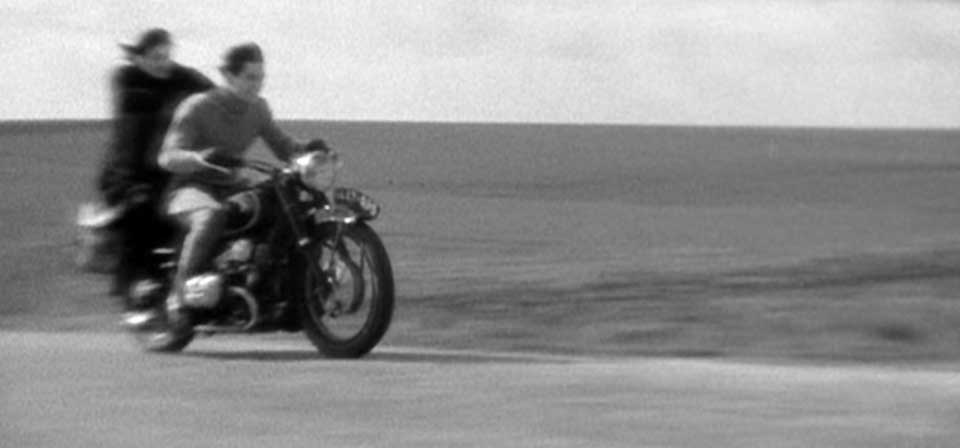
Diary of a Country Priest (1951)
Faithfully adapting its source material, Catholic novelist Georges Bernanos’s fictional autobiography of a soul, the film profoundly contemplates the spiritual meaning of suffering and persecution, conversion and incorrigibility, and the dark night of the soul with a rigor and insight evocative of Augustine’s Confessions or Thérèse’s Story of a Soul.
Goodbye, Mr. Chips (1939)
Goodbye, Mr. Chips is the original inspirational-teacher story, and a beloved valentine to classical education, tradition, and the English public boarding schools of a bygone era.
Goodbye, Mr. Chips (2002)
Not a remake of the 1939 classic but a new adaptation of James Hilton’s sentimental novella, Masterpiece Theater’s engrossing Goodbye Mr. Chips couldn’t be more different from the 1939 film — and that’s all to the good.
Good Morning (1959)
Formality and courtesy attend adult interactions, but beneath the surface lurk petty misunderstandings, resentments, suspicions. A boy complains that adult conversation is bloated with meaningless, empty pleasantries, while his friends prefer to engage each other with an amusement that appears to be an Asian equivalent of “Pull my finger.”
Eternal Sunshine of the Spotless Mind (2004)
Obviously, a Kaufman film called Eternal Sunshine of the Spotless Mind isn’t going to be as cheerful and wholesome as the title might suggest. Despair, isolation, and loneliness continue to hang like a fog across his world. Eternal Sunshine also resembles his other films in its characters’ milieu of general dissipation, casual sex, drug use, and so on.
Shattered Glass (2003)
With unsettling plausibility, first-time director Billy Ray depicts Glass’s uncanny ability to insinuate himself to his coworkers while ingeniously covering his tracks, mounting a deception on such a scale his peers and superiors can scarcely comprehend it even when he’s practically caught red-handed.
The Ox-Bow Incident (1943)
The brief story is as simple as it is tragic. Recent incidents of cattle rustling have a small Nevada town jumpy, and news that a popular local rancher has been murdered has the townsfolk up in arms. In the absence of the sheriff, a self-appointed posse forms under the leadership of an ambiguously disreputable ex-Confederate officer, despite the ineffectual protests of some, including the town judge.
Heaven Knows, Mr. Allison (1957)
Like director John Huston’s similarly themed The African Queen, the film finds conflict mixed with romantic tension in a tale of a demure religious woman thrown together with a rugged male loner. Here, though, the complicating factor is not fastidiousness on the part of the religious woman, but the woman’s vocation.
Hulk (2003)
Not the best or most exciting of comic-book movies to date, but the most thoughtful and arguably one of the most interesting, Ang Lee’s Hulk offers a new look at Marvel Comics’s green-skinned Jekyll-and-Hyde pulp anti-hero through the director’s poetic, psychologically attuned sensibilities.
One Man’s Hero (1999)
Who is right? The issues are complex, and historians and faithful Catholics disagree (see related article). One Man’s Hero is sympathetic to the St. Pats and critical of American "Manifest Destiny" expansionism and anti-Catholicism.
Lilies of the Field (1963)
Sidney Poitier won a Best Actor Oscar for his portrayal of Homer Smith, a cheerful, itinerant Baptist handyman who one day pulls off the road and approaches a house with no more thought than to get water for his car radiator.
Big Fish (2003)
Like Haley Joel Osment in Secondhand Lions wanting to know the truth about the tales of his uncles’ alleged exploits, Ed’s son Will (Billy Crudup) wants to know whether his dying father really was a Big Fish in a small pond, or whether his father’s tales were just Big Fish stories. Big Fish also echoes Secondhand Lions by ending with a funeral scene that provides some answers as Will finally meets certain individuals from his father’s past.
Lawrence of Arabia (1962)
One of the cinema’s grandest spectacles, Lawrence of Arabia is at turns exhilarating, devastating, and puzzling as it ponders the mystery of a man who was a mystery to himself.
The Silence of the Lambs (1991)
Lecter fascinates us because he embodies qualities that we associate with civilized, reasonable existence, yet he is murderously sociopathic. In our therapeutic age, he’s a shocking reminder that, beyond all psychobabble about “behavior modification” and the like, there remains the sheer reality of good and evil. The doctor is in: God help us all.
Man on the Train (2002)
Thanks to the skills of director Patrice Leconte, L’Homme du train (Man on the Train) would have made an excellent silent film, except that we would have missed the enchanting tones of Jean Rochefort’s retired poetry teacher, Monsieur Manesquier. Manesquier talks like a schoolboy who has yet to leave behind his school days — his rich words and phrases touch on his dreams and wishes, and are charmingly tinged with sexual innuendo and self-deprecation. Rochefort’s characterization is perfectly complemented by Johnny Hallyday’s stoic career criminal, Milan, who responds to questions with either silence or sapient, terse words.

Master and Commander: The Far Side of the World (2003)
Like a cannon blast across the bows, Peter Weir’s Master and Commander: The Far Side of the World is a thunderous, almost defiant declaration heralding the arrival of a force to be reckoned with.
What Lies Beneath (2000)
But when the plot then descends into a Lethal Weapon-type action-chase scene, it’s clearly gone off the rails: a proper ghost story has an entirely different atmosphere from a Lethal Weapon action flick.
Willard (2003)
The original 1971 Willard, a nasty B-grade horror flick about an oppressed misfit whose only friends are an ever-growing army of rats, was not a movie that cried out for a remake. Given the decision to make one, though, it’s hard to imagine a more fitting casting choice than Crispin Glover.
Molokai: The Story of Father Damien (1999)
A native of Belgium, ordained in Honolulu, at the age of 33 Fr. Damien volunteered to become the first and only priest serving the leper colony. There he spent himself attending as best he could to the people’s needs, both spiritual and physical, offering the sacraments but also dressing wounds, helping to shelter them from the elements, even constructing coffins and digging graves.
Radio (2003)
But Radio isn’t really interested enough in its title character as a person to show us much in the way of his supposedly edifying behavior. Radio is less an active character in his own film than a passive recipient of kindness or cruelty, a subject of debate and controversy, a political football to be kicked around. When high-school students between classes cheerfully greet Radio as he cautions them not to run in the hall, the point isn’t how much he cares about them, but how much they care about him.

Pieces of April (2003)
Slyly, disarmingly, this bittersweet comedy-drama got past my defenses and got me in its corner, caring about its flawed, wounded characters, wanting to see them heed their better angels and overcome the legacy of their past mistakes and disappointments.
Don Q Son of Zorro (1925)
Don Q Son of Zorro, named one of the year’s ten best films by The New York Times, actually outdoes its predecessor, with a stronger and more sophisticated plot, better pacing, more interesting and complex characterizations, grander production values and set design, and more consistent action.
The Big Sleep (1946)
The dialogue is hard-boiled and crackles with wit, the plot is fast-paced and nearly impenetrable, and Humphrey Bogart is coolly unflappable in Howard Hawkes’s stylish noir classic The Big Sleep, based on the Raymond Chandler novel.
Grave of the Fireflies (1988)
A haunting, harrowing war movie, an emotionally devastating character study, and an extraordinarily restrained example of animé or Japanese animation, Grave of the Fireflies is a unique and unforgettable masterpiece.
I’m Going Home (2001)
From nonagenarian writer-director Manoel de Oliveira, who’s been making movies for over seven decades, comes a sad, thoughtful character study of an aging French actor named Gilbert Valence (Michel Piccoli). On stage, in productions of Ionesco’s Exit the King and Shakespeare’s The Tempest, Valence gives impressive readings of the dramatic death-speeches of aged protagonists; but his own words in a key moment of frailty and finality, though equally haunting, are much more prosaic and anticlimactic.
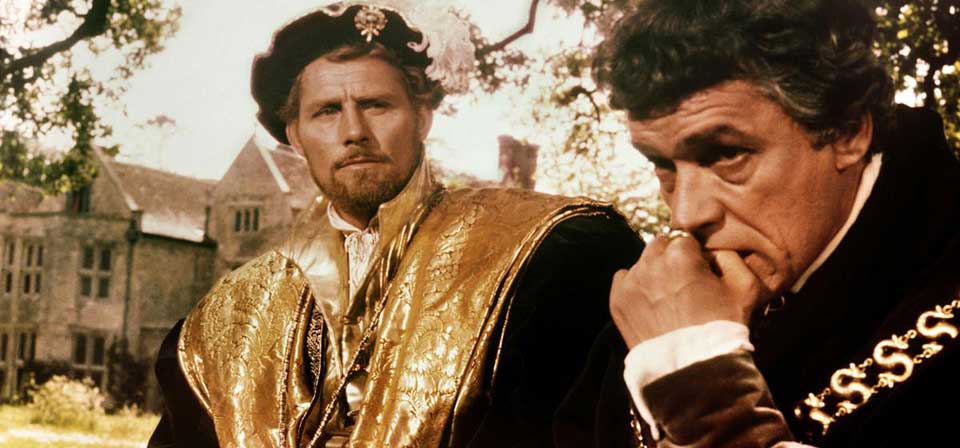
A Man for All Seasons (1966)
The screenplay, well adapted by Robert Bolt from his own stage play, is fiercely intelligent, deeply affecting, resonant with verbal beauty and grace. Scofield, who for years starred in the stage play before making the film, gives an effortlessly rich and layered performance as Sir Thomas More, saint and martyr, the man whose determined silence spoke more forcefully than words, and who then spoke even more forcefully by breaking it.
Signs (2002)
Signs has the
heart that was lacking in Unbreakable, but stumbles badly
in its treatment of the paranormal, in this case the world of
"X-Files" / "Twilight Zone"
Here I Stand: The Good and Bad in Eric Till’s Luther
In one sense, I’d like to see more films like this made. At the same time, Luther is also a seriously flawed film. Relentlessly hagiographical in its depiction of Luther and one-sidedly positive in its view of the Reformation, the film also distorts Catholic theology and significant matters of historical fact, consistently skewing its portrayal to put Luther in the best possible light while making his opponents seem as unreasonable as possible.
Friendly Persuasion (1956)
Scenes of silent, unstructured Quaker meetings are contrasted without comment or judgment to the boisterous singing of the local Methodist church, but — despite Eliza’s best efforts — the film is largely an account of the compromises the Birdwells are and aren’t willing to make. Their principles are repeatedly put to the test, at the local fair, on the Sunday morning ride to the meeting house as a smug neighbor blows past Jess’s slow horse every week, and so on. One of the best vignettes concerns an impasse between Jess and Eliza over the shocking purchase of an organ, and the delightful way the conflict is finally resolved.
Secondhand Lions (2003)
In the end, though, Secondhand Lions is a pleasant and entertaining film that’s neither as demanding nor as satisfying as the superior Holes. The setup promises more early conflict than the first act delivers, and the story-arc doesn’t give the protagonist enough to do. Beyond that, the film gestures at moral lessons it never quite fleshes out or illustrates, and what ought to have been a key plot point is relegated to a tacked-on coda, depriving it of the crucial significance it should have had.
The Guys (2003)
Unsurprisingly, the film is true to its theatrical roots: low-key, set mostly within the confines of an upper West Side apartment, centered on the conversation between the fire captain and the writer. In keeping with the minimal production values of the stage play, the film was shot in nine days on a limited budget. Dramatic 9/11 footage, flashbacks of the missing firefighters, even a romance between Nick and Joan were all proposed by Hollywood producers, but the filmmakers rightly sensed that anything like this would have been disastrous.
Matchstick Men (2003)
When his supply of meds unexpectedly dries up, Roy predictably disintegrates, much to Frank’s concern. Soon, though, Roy is seeing a psychiatrist (Bruce Altman, Changing Lanes), who not only provides the medication he needs, but gets him talking and thinking about his life — in particular the woman who walked out on him fourteen years ago, and whether or not she was pregnant at the time.
Fantastic Voyage (1966)
A landmark of 1960s sci-fi, Fantastic Voyage remains compelling entertainment despite dated special effects, deliberate pacing, and indifferent dialogue and acting, thanks in part to the genuine wonder it brings to its premise.
Nicholas Nickleby (2002)
Writer-director Douglas McGrath, who previously adapted and directed the charming 1996 version of Emma, does a respectable job of retelling as much of Dickens’ tale as possible in the time alloted. The casting is generally very good, with Christopher Plummer as the heartless, well-to-do uncle Ralph Nickleby, Jim Broadbent as the squinting, leering Squeers of horrific Dotheboys Hall, and Juliet Stevenson as his equally terrible wife.
The Gathering Storm (2002)
Although the title is taken from the first volume of Churchill’s history of the war, The Gathering Storm is as much about Churchill’s personal life as his political trajectory — sometimes to excess, since the political side is usually more interesting. The warts-and-all portrait includes his loving but sometimes strained marriage to Clementina (Vanessa Redgrave), his financial troubles and hard drinking habits, his melancholia or "black dog," his amateur painting and bricklaying, and his habit of absent-mindedly losing himself in rehearsing or dictating speeches while in the bathtub or dressing and undressing.
The Rookie (2002)
There’s an easygoing, folksy charm to this film, accentuated by a country-themed soundtrack and characters who say such things as “I’m gonna need a longer street for that talk” and “Lord knows I’m ready for both sides of the bed to be warm again.”
Northfork (2003)
With its surreal, dreamlike ambiance, juxtaposition of transcendent and mundane elements, lyrical imagery, and contemplative pacing, Northfork alternately evokes comparisons to such films as Wim Wenders’ Wings of Desire, Malick’s Days of Heaven, and certain films of Tarkovsky, Bergman, David Lynch, and Carl Dreyer.
The Emperor’s Club (2002)
He’s overly pedantic: Instead of merely urging a student to stay off the grass, he exhorts, "Walk where the great men who have gone before you have walked" — not just because it’s good for the grass, but "because it’s good for you."
Seabiscuit (2003)
Seabiscuit canters handsomely around the track less like a scrappy race horse than a slightly overfed show horse, playing to the crowd, confident that there’s no real competition breathing down its neck. It is right.
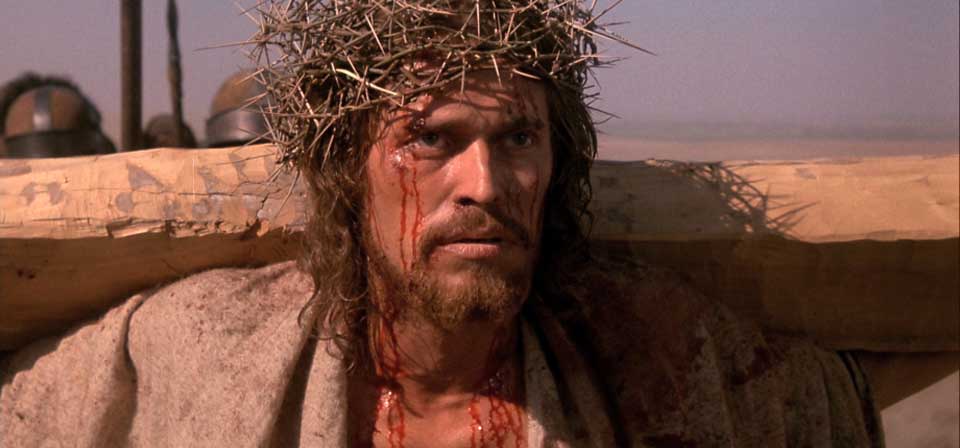
The Last Temptation of Christ: An essay in film criticism and faith
We must not be too quick to judge any particular portrait of Christ merely because it challenges our expectations or makes us uncomfortable, or because it doesn’t immediately evoke his divinity. After all, Jesus himself often confounded the expectations of his contemporaries, and didn’t necessarily impress most of them as being divine.
The Song of Bernadette (1943)
Based on the historical novel by Jewish author Franz Werfel, the beloved classic The Song of Bernadette stands head and shoulders over most religiously themed fare from Hollywood’s golden age.
Punch-Drunk Love (2002)
Regarding Punch-Drunk Love, much has been made of the sense of not knowing what’s going to happen next. Anderson’s opening scene is like a manifesto of unpredictability. Opening with a phone conversation in a stark warehouse space, the scene follows Barry Egan (Sandler) outdoors, where the morning waits in expectant silence for the day to begin, as the audience waits for the movie to begin. What kind of day will it be? What sort of movie are we watching?
Casablanca (1942)
The result of this somewhat haphazard collaboration is a breathtaking creative synergy, a perfect storm in which everything happened to come together with magical rightness. The sparkling script balances wittily cynical dialogue, weepy sentimentalism and clear-eyed idealism. The characters that matter are credibly, even seriously flawed, yet remain deeply sympathetic and open to redemption. The tightly crafted plot is at once intricate and elegant, at turns rollicking and stirring, and the snappy storytelling doesn’t come at the expense of rich, moody atmosphere. The top-notch cast are at the top of their games, and the timeless score accents a classic wartime melodrama that hasn’t lost a thing as time goes by.
The Fugitive (1947)
Not to be confused with any version of the story of Dr. Kimble and the one-armed man, this Fugitive is director John Ford’s underrated adaptation of Catholic novelist Graham Greene’s masterpiece The Power and the Glory.
Gangs of New York (2002)
That book, with its breathless vignettes of the 19th-century lower Manhattan underworld, has no central plot or unifying storyline. Similarly, the most striking moments in Scorsese’s film come as glimpses into that time and place. When we see hordes of immigrants milling about in the unguessed catacombs beneath the Old Brewery of the Five Points neighborhood, or rival fire brigades brawling in the streets rather than fighting the fire, it’s easy to feel that here, surely, is a dark and strange world that would be interesting to explore, a world in which memorable stories must have taken place.
Phone Booth (2003)
Phone Booth takes the formula of Die Hard and Speed, in which the protagonist is trapped in a confined space by a wily psychopath with whom he communicates only by phone (or walkie-talkie), to its narrowest physical dimensions yet.
Sahara (1943)
One of the best WWII-era WWII movies, Sahara is a thoroughly entertaining war actioner starring Humphrey Bogart as a tough American sergeant commanding a tank crew in the Libyan desert.
8 Mile (2002)
(Written by Robert Jackson) 8 Mile is the story of a cast of characters who were dealt a lousy set of cards by life and who then proceed to tear most of their cards in half.
Final Solution (2002)
It’s a melancholy truth that religion is often a key ingredient in long-standing conflicts festering in certain troubled regions around the globe: the Middle East, Northern Ireland, the Balkans. Final Solution depicts the way religion has been involved in the racial strife in South Africa — but it also points to the role that faith can and should play in reconciliation and healing as well.
The Game (1997)
(Written by Robert Jackson) What do you get for the man who has everything?
Gods and Generals (2002)
(Written by Robert Jackson) Gods and Generals is an extremely one-sided account of the first half of the Civil War.
Narc (2002)
(Written by Robert Jackson) Narc is trying to be something. Really hard. It’s obvious. The question is: What is it trying to be?
The Pianist (2002)
Now, almost ten years later, Polanski has finally faced his demons and made a film of almost ferocious objectivity — a film devoid of even the smell of polemicism, sentimentality, melodrama, or cliché. Not a celebration of the human spirit, resisting both deceptive moral uplift and despairing moral nihilism, neither demonizing the Germans nor lionizing the Jews, The Pianist is a work of exquisite restraint. Any misstep might have resulted in reducing the horror of genocide to a prop in a morality-play, but Polanski surefootedly avoids every trap and temptation in his path.
John Q (2002)
John Q, which is sort of the moviegoing equivalent of being taken hostage, was directed by Nick Cassavetes (She’s So Lovely). Cassavetes — like the film’s hero, John Q. Archibald (Washington) — has a child in need of a life-saving organ transplant. I feel for the director, and for his hero. I cannot condone the actions of either.
Bend It Like Beckham (2002)
Movie audiences reliably enjoy just about every ingredient involved in Bend It Like Beckham, an East-meets-West comedy about an Indian family living in London’s Hounslow borough.
The Mighty (1998)
Based on the children’s book Freak The Mighty, Peter Chelsom’s less oddly named The Mighty tells the story of a remarkable friendship between two young boys, both outcasts. Max (Elden Ratliff) is dull-witted but intimidating; Kevin (Kieran Culkin) is bright but crippled by Morquio’s Syndrome.
Tears of the Sun (2003)
Tears of the Sun (Columbia) presents a picture of American military presence abroad that is simultaneously appealing and troubling: superheroic Navy SEALs going about doing good, rescuing refugees, battling evil ethnic-cleansing rebels, and earning the gratitude and goodwill of indigenous peoples, all in defiance of their orders and American foreign policy.
Moonlight Mile (2002)
This might seem an odd way to put it, but writer-director Brad Silberling’s Moonlight Mile could be thought of as a kind of backwards mirror-image of writer-star Nia Vardalos’s indie hit, My Big Fat Greek Wedding.
Chicago (2002)
(Co-written with Emily Snyder) Like Moulin Rouge!, Chicago involves sordid goings-on in a rather seamy milieu; but where the earlier film tried to contrast its dissolute ambiance with heart-warming sincerity and idealism, Chicago is cynical to the core.
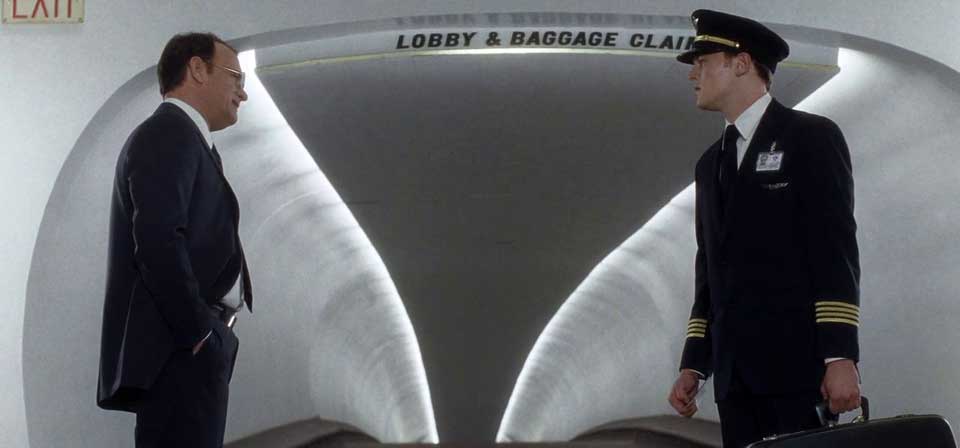
Catch Me If You Can (2002)
The week after I graduated from high school, I went through a second high-school graduation at a neighboring high school, using a fictitious name. For no particular reason — just as a lark.
Kangaroo Jack (2003)
Now at last, from the creators of Coyote Ugly, comes the culmination of this trend: the action-comedy with black star, white star, love interest, talking kangaroo, flatulent camels, and poop jokes. Yes, it’s Kangaroo Jack — the world’s first family romantic action-comedy cross-racial buddy gross-out flick.
The Hours (2002)
Still others face demons of a yet more personal and internal sort — addiction, self-destructive behavior, disordered appetites. And then there are those unhappy individuals who seem to carry suffering itself within their very psyche — those with clinical depression and other forms of mental illness.
Solaris (2002)
This year’s Solaris from writer-director Steven Soderbergh (Erin Brockovich is part of an ongoing trend toward science fiction aspiring to the tradition of 2001. Not long ago, science fiction had become a wasteland of forgettable, mindless action flicks. The year 2000, for example, gave us Red Planet, Battlefield Earth, The 6th Day, Hollow Man, Pitch Black, and Supernova (as well as Mission to Mars, which didn’t fit the mindless-action pattern but managed to be lame anyway). Even the previous year’s The Matrix was notable primarily for its kinetic impact and craft; the story, though clever, was long on allusions and short on genuine resonance.
K-PAX (2001)
Prot pulls off these party tricks quite convincingly. Yet get him started on his theories about mankind, family, society, and the like, and the spell is broken: He’s clearly delusional. Not that I’m saying anything about the truth or falsehood of his claims. Prot may very well be an alien. That doesn’t mean he isn’t delusional.
Nurse Betty (2000)
In the end, how you feel about Nurse Betty will in good part depend, I suppose, upon whom you agree with, Charlie or Wesley. If you find Betty as enchanting and remarkable as Charlie does, then you may be relieved and happy when her troubles are over and she is at last able to realize her dreams. On the other hand, if like Wesley you regard her as ridiculous and pathetic, then you will find this movie a contemptuously hateful tale of cruelty and delusion, devoid of any spark of sympathy or compassion.
Adaptation (2002)
Formally, Adaptation resembles the sort of essay a clever student will sometimes pull together by taking the assigned topic as a point of departure for a composition of his own choosing, knowing that it will stand out for originality amid monotonous submissions and win points for daring and wit from a bored teacher appreciative of any show of interest.
Tuck Everlasting (2002)
The story, originally set in 1880 but moved to 1914 for the movie, concerns a sheltered young girl from a well-to-do family who is called "Winifred" by her overprotective parents and grandmother, and might be called "Winnie" by her friends if she had any. Winnie (Alexis Bledel of TV’s "Gilmore Girls") is so timid that when she decides to run away from home, she heads for the family-owned woods adjacent to her house, never actually setting foot off her parents’ property.
K-19: The Widowmaker (2002)
Unfortunately, these novel elements are tied to a human conflict between two antagonistic captains (Harrison Ford and Liam Neeson) that is not only hackneyed and uninvolving, but morally simplistic and finally flat-out insulting. It’s hard to be unmoved by what the men of the K-19 go through, but it’s equally hard to overlook the glaring flaws in the human drama — especially when the latter is directly related to the former. As an exercise in logistics and adversity, K-19 is compelling, but as a story about human decisions and moral issues, it’s full of holes and clichés.
American Beauty (1999)
Some movies have a moral. I say that as a mere statement of fact, with no implication that either having or not having a moral necessarily makes a movie better or worse. Some movies have a moral; American Beauty - and this is also a mere observation, not a value judgment - has an aesthetic.
Dragonfly (2002)
Dragonfly is a ghost story of sorts, but it isn’t a horror film (though it occasionally thinks it is). The ghost seems to be the late wife of Dr. Joe Darrow (Kevin Costner); and who would be frightened of his own best beloved, even if she happened to be a ghost?
Road to Perdition (2002)
I enjoyed looking at Road to Perdition, but I didn’t especially enjoy watching it.
Divine Secrets of the Ya-Ya Sisterhood (2002)
Despite being more of the "Yo" than "Ya" persuasion, I think I’m pretty receptive toward what are commonly called "chick flicks." After all, my wife and I enjoy the same "guy movies"; why shouldn’t we enjoy the same romances and other female-targeted films?
The Sum of All Fears (2002)
Though constructed as an action-oriented thriller, the film’s centerpiece is a wrenching glimpse of a scenario that may be in our nation’s future, depicted in a way that’s neither sensationalized nor minimized.
Insomnia (2002)
Daylight floods Dormer’s life, relentless, ubiquitous — like the penetrating glare of the ongoing Internal Affairs probe back in LA, where Dormer may or may not have something to hide. Like the searching gaze of Alaskan local cop Ellie Burr (Hilary Swank) as she investigates Dormer’s account of a second killing that occurs when an attempt to catch the killer goes tragically awry. Like "the eye of God that will not blink," as Roger Ebert describes the Arctic Circle’s midnight sun in his review of the original film.
The Salton Sea (2002)
This is not a thought Tom takes to heart. Nor is it one he struggles with, or indeed ever thinks about again. The quest for revenge is at the heart of The Salton Sea, and although in this one scene the film fleetingly acknowledges the possibility of an alternative to bitterness and hatred, it’s not in the context of any larger interest in or exploration of the moral issues.
Crouching Tiger, Hidden Dragon (2000)
The story is said to be set in 19th-century China, but its roots are older, reaching for a mythic age of larger-than-life heroes and superhuman derring-do. Heroes with paranormal abilities were also a theme of the recent Unbreakable; but Crouching Tiger, Hidden Dragon has what was lacking in Unbreakable: a sense of wonder, of exhilaration, of mystery and beauty and hope.
High Crimes (2002)
Only Jim Caviezel (The Count of Monte Cristo; Frequency) brings anything new to the table, displaying even more range and subtlety than in his recent starring turn in The Count of Monte Cristo. Other than his performance, High Crimes holds few surprises.

Romero (1989)
“A good compromise choice” is how one observer describes the 1977 appointment of Oscar Romero (Raul Julia) — a conservative, orthodox, apolitical bishop of a small rural diocese — to the archbishopric of San Salvador. By the time Archbishop Romero’s tempestuous three-year tenure comes to its violent end, “compromise” is a word no one will ever again think of in connection with him.
Behind Enemy Lines (2001)
Changing Lanes (2002)
Neither Gipson nor Banek makes much of a poster child for the danger of civilized behavior devolving into savagery, since neither of them seems quite stable from the outset. Gipson’s a recovering alcoholic with violent tendencies who seems to cause trouble wherever he goes, while Banek’s a soulless shell of a human being too shallow to realize that he’s as unprincipled as everyone else around him, including his wife (Amanda Peet). That unstable human beings can do unpredictable and terrible things isn’t exactly a dramatic revelation; yet even so the film relies so much on contrivance and arbitrary behavior that the events and their consequences seem to have little to do with the human nature of the characters involved.
A Beautiful Mind (2001)
John Nash goes through life making connections, but not with other people. He sees meaningful patterns where the rest of us see only unintelligible randomness. Ideas are as real as people to him. Maybe more so. Eventually the ideas become too real — or the people not real enough — and Nash withdraws inexorably into the tangles of his own incandescent mind.
Pleasantville (1998)
The film’s central conceit is that the process of colorization is spread through acts of exploration or self-discovery by which people step outside their customary ways into a new world. In the black-and-white world of the 1950s TV sitcom, one common means of transformation is sexual activity, which didn’t exist in "Pleasantville" until the teenagers (Jennifer in particular) introduced it. When Jennifer gently explains the facts of life to her sitcom mother (Joan Allen), the latter is certain that her prosaic husband (William H. Macy) could never be induced to engage in such activity; so Jennifer proceeds to coach her mother (offscreen) on how to commit self-abuse. The mother then proceeds to do so, with such explosive results that by a kind of sympathetic magic the tree in the front yard bursts into flame.
A Walk to Remember (2002)
Like its heroine Jamie, A Walk to Remember is pious, wholesome, and eminently open to mockery and derision. Also like its heroine, it doesn’t care what people think of it.

Unbreakable (2000)
Such “hope” as Shyamalan has to offer is less persuasive and less memorable than the fears and horrors he conjures; the overall impression created by his film is an ultimately dehumanizing, depressing one.
Training Day (2001)
Washington’s knockout performance is the main reason to see Training Day. It may also be the crux of the film’s moral difficulty.
Tortilla Soup (2001)
Tortilla Soup isn’t the delicacy that Eat Drink Man Woman was, nor does it compare with the exquisite meals prepared by the patriarchs of either film. But on the level of comfort food this remake is enjoyable enough, unless of course you’re a purist conoisseur like Martin. Watching it, I laughed out loud any number of times, and so did others in the theater.
Thirteen Days (2000)
Thirteen Days is about how a few imperfect men more or less saved the world. Whatever else Kennedy and these other men may or may not have done, this was perhaps their finest hour, and the world owes them a debt of gratitude. If the threat of Mutually Assured Destruction seems remote and antiquated today, it is at least partly because of the events dramatized in this film. Thirteen Days is a fitting dramatic tribute to the deadly brinksmanship that pulled us back from the edge during the most volatile two weeks of the Cold War.
The Straight Story (1999)
We hear a few anecdotes about Alvin’s life, but nothing meant to make us say, "Aha — so that’s why…" The only "explanation" comes in the very last moments of the film, when we finally see for ourselves the point of Alvin’s determination to make the journey his own way; why he couldn’t accept a kind stranger’s offer to drive him the rest of the way.
Shadowlands (1993)
Anthony Hopkins plays “Jack” as a somewhat abstracted ivory-tower academic rather than the robust and jovial figure he actually was. But Lewis’ penetrating intellect and faith are here, as is his love for Joy (Winger), and the crippling grief that came afterwards. A challenging and inspiring film.
Saving Private Ryan (1998)
Steven Spielberg’s harrowing WWII drama opens with a horrifying recreation of the D-Day invasion of Normandy Beach that has been called the most realistic war sequence ever shot.
Rob Roy (1995)
Based on Sir Walter Scott’s historical novel, this is the story of Rob Roy MacGregor (Neeson), head of a Scottish highland clan who seeks to better the plight of his people with money borrowed from local nobility, only to have the money stolen by confederates of the corrupt nobility.
Pearl Harbor (2001)
Yet whereas Titanic was the work of a master manipulator, a man with a special genius for making cheesy melodrama seem moving and gripping, Michael Bay has so far in his career shown no competence for anything but pyrotechnics. Cameron’s film shrewdly focused on its three leads (Leonardo DiCaprio, Kate Winslet, and Billy Zane), all of whom are gifted with real charisma and screen presence. Pearl Harbor, however, is burdened by a sprawling cast of characters, led by Ben Affleck (another Armageddon alum), who’s as blandly generic as no-name corn flakes — and doesn’t even compensate by taking likeable roles. Affleck’s out-acted by relative unknown Josh Hartnett (Blow Dry), the best friend and romantic rival (even though Hartnett’s character is equally underwritten); he’ll be opening movies himself before long.
The Patriot (2000)
Two things The Patriot isn’t are cynical or ironic. It’s corny, yes, and manipulative, not to mention clichéd, sentimental, and platitudinous. But at least it believes in its clichés and sentiments and platitudes. Its convictions may be half-baked, but it has the courage of them.
The Others (2001)
Then re-anchor the story to reality by asking whether there are really any ghosts at all — whether apparently spectral manifestations might not in fact be no more than an unstable woman’s imaginings, or the cruel pranks of a spiteful child, or the malicious work of mysterious servants with unguessable motives. Bear in mind that moviegoers are increasingly wise to Sixth-Sense style tricks, and will carefully analyze each of these characters in turn, trying to figure out what might not be as it seems.
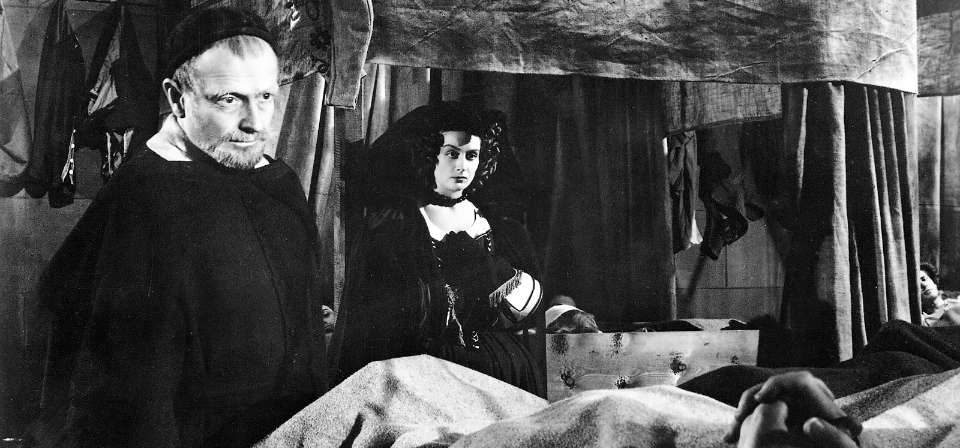
Monsieur Vincent (1947)
Monsieur Vincent, director Maurice Cloche’s beautifully crafted, award-winning biopic of St. Vincent de Paul, celebrates the saint’s single-minded devotion to the poor without romanticizing the objects of his devotion and recipients of his charity.
The Mission (1986)
From the unforgettable opening sequence, with its stunning depiction of the martyrdom of a silent Jesuit missionary at the hands of equally silent South American natives, the film is shot through with piercing, haunting imagery, pictures of enduring imaginative force.
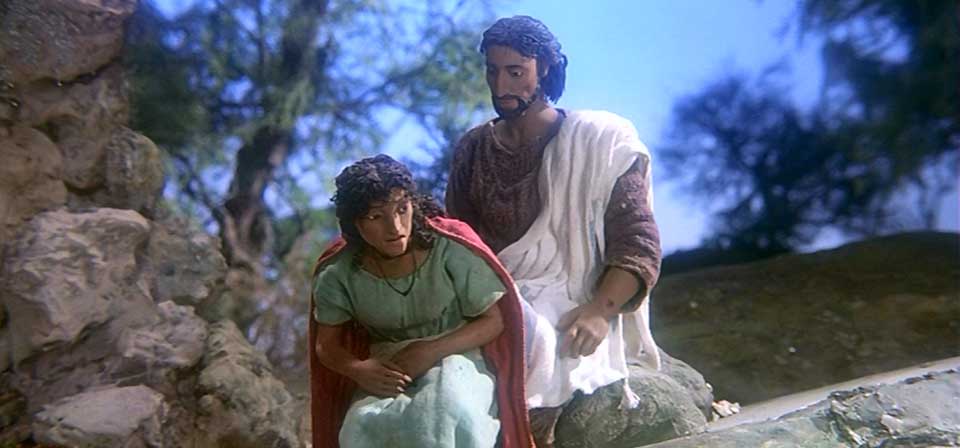
The Miracle Maker (2000)
Fiennes sounds like a man improvising a public speech as he delivers long-familiar words about the house on the rock or the parable of the mustard seed. His Jesus is attractive, composed, commanding, and compassionate; he can rise to righteous anger (as at the cleansing of the temple), but has an acute sense of humor (seen particularly in satirical parables such as the log in the eye).
The Mexican (2001)
There’s some freshness here amid the formula, but mainstream audiences are liable to find The Mexican too long and slow, too violent, and too off-putting. A few film aficianados and critics, numbed by the present dismal spate of lousy Hollywood efforts, may hail it as a wonderful find. But only the absence of worthwhile competition — and a highly watchable performance by "The Sopranos"’s James Gandolfini (who gets far more screen time with Roberts than Pitt does) — qualifies this middling effort as a modest success by any standard.
Memento (2001)
This device — unfairly dismissed by some critics as a mere gimmick — creates an experience that in one way resembles that of the protagonist, Leonard Shelby (Guy Pearce). Leonard suffers from a unique trauma-related condition that prevents him from retaining new memories. It’s amnesia in reverse: The amnesiac remembers only his life after his trauma; Leonard remembers only his life before. He knows his name, his past history, everything — up to a point. The last thing he remembers is failing to prevent the rape and murder of his wife.
Life is Beautiful (1997)
Contriving to hide the boy from camp officials (who soon put the other children to death), Guido tells Giosue that the concentration camp is actually an elaborate role-playing game in which the "players" are competing for points in the hopes of winning a real battle tank. From then on, Guido will take any risk, court any danger, to maintain his son’s illusion that none of it is real.
The Insider (1999)
These two "martyrs" are not saints; nor are they as cautious and discreet as Thomas More in A Man for All Seasons, which leaves them open to unnecessary suffering. A sobering examination of corruption, courage, cowardice, and the sometimes catastrophic costs of telling the truth.
The Green Mile (1999)
Other critics have already criticized the film on several fronts: social, aesthetic, cultural. In keeping with the general principles of this site, I’ll give priority to the spiritual and religious implications of the story. At the heart of The Green Mile is a powerful, compelling figure of almost preternatural innocence and goodness whose origins are obscure — one character describes him as having "fallen from the sky" — and who possesses a mysterious power to take the suffering of others upon himself. He is also able to weigh men’s hearts, and is startlingly capable of judgment and vengeance as well as mercy and healing.
Gosford Park (2001)
It’s this dynamic that Altman is really interested in, not “whodunit.” Or, if Altman does care whodunit, it’s only insofar as the answer illuminates the film’s real themes of snobbery and resentment, exploitation and interdependence, privilege and privation.
The Fugitive (1993)
Ford exudes decency in the role of the innocent man wrongly accused, as Kimble throughout the movie consistently goes out of his way to help other people at his own expense, regularly risking capture and even death for the sake of others. Best known for playing confident, capable action heroes in the Indiana Jones and Star Wars movies, Ford is also remarkably persuasive in the role of the unlikely action hero — the unassuming, nonphysical, white-collar professional who isn’t used to swashbuckling (a role he played also in Frantic and Air Force One).
Frequency (2000)
This is a film about the legacy of fatherhood and the inheritance of sonship, about the unbreakable connection and the unbridgeable gap between one generation and the next. It is a celebration of masculinity, but it contemplates how men relate to women as an index of their manhood.
E.T. The Extra-Terrestrial (1982)
“The story of a boy and his dog,” writes one critic. “Close Encounters for kids,” writes another. Still others focus on the Christological resonances, particularly in connection with another messianic sci‑fi film, The Day the Earth Stood Still, with its peaceful visitor from the heavens who dies and rises again.
Erin Brockovich (2000)
Watching Erin take on corporate ruthlessness and professional apathy, I often felt that while I couldn’t always condone her choice of words, I appreciated the spirit behind them — not to mention the effect they had on her hapless victims. This movie makes you feel that one person really can make a difference; especially since it’s based on a true story.
The End of the Affair (1999)
The film may be said to be largely faithful to the book, in the sense that the great majority of scenes are adapted more or less as they were written. But this is like saying that the character of Sarah (Julianne Moore) is largely faithful to her husband Henry (Stephen Rea) because the great majority of her time she isn’t sleeping with her lover Bendrix (Ralph Fiennes): the betrayal is crucial, and gives the lie to the supposed fidelity of the rest.
Dead Man Walking (1995)
Tim Robbins argues his point fearlessly, not taking the easy way out, not stacking the deck by emotionally manipulating the audience, but instead taking a worst-case scenario: Rather than giving us a murderer who isn’t really so bad, merely misunderstood and mistreated and so forth, Robbins gives us a thoroughly revolting individual, one who spouts racist propaganda not because he believes it but simply because it is shocking and antisocial and hateful; who tries to humiliate the one person interested in his welfare with leering come-ons aimed at her consecrated chastity.
Come to the Stable (1949)
The bishop (Basil Ruysdael) is a decent enough chap, sympathetic to the sisters’ mission but daunted by the practical difficulties. As their cause goes forward, however, he begins to suspect that what’s driving them is an irresistible force before which there is no known immovable object: "There hasn’t been for 2000 years."
Cast Away (2000)
In a way, the obnoxious tell-all trailer for Cast Away gives away more than the film itself. That trailer, with moronic thoroughness, reveals the film’s set-up, the crisis, the hero’s ups and downs, his triumph, the climax, and the denouement. What it doesn’t let on is that the movie itself won’t tell you what to think or how to feel about what happens, even at the end. The trailer is typical Hollywood feel-good, inspirational fare; the story in the film is rather more ambiguous and challenging.
Black Hawk Down (2001)
The shadow of September 11 will not always hang over the movies, but as I watched Ridley Scott’s Black Hawk Down it seemed to be everywhere: an ominous column of smoke rising from a city skyline; people watching helplessly via video screens as a catastrophe unfolds before their eyes in real time; enemies striking an unexpected and terrible blow that seems to be as bad as anything can possibly be — followed by a second, equally terrible blow.
Being John Malkovich (1999)
The malleable, plastic vision of human nature in general and of sexuality in particular, in which gender and relationships shift and merge and re-form like blobs of goo in a lava lamp, represents a profoundly anti-human fantasy and an affront to personal dignity.
Becket (1964)
Peter O’Toole roars magnificently both in laughter and in rage; his Henry is a simple, direct, utterly unprincipled man who sees the world in two great categories: (a) things he wants, and (b) obstacles to getting them.
Babette’s Feast (1987)
In the end, Babette’s Feast is a quiet celebration of the divine grace that meets us at every turn, and even redeems our ways not taken, our sacrifices and losses. Whatever we think has been given up or lost, God gives back in greater abundance, one way or another. It may not be till heaven that we truly become all that he intends; but his grace is here and now, whatever our circumstances, and with him all things are possible.
Angels with Dirty Faces (1938)
The Dead End Kids have dirty faces, all right — but they’re no angels. Tough-talking young hoods much given to slapping one another’s faces and terrorizing their lower East Side Manhattan neighborhood, they may tolerate sincere, savvy Father Jerry Connolly (Pat O’Brien) and his efforts to divert them from the dangers of life on the street; but it’s in Fr. Jerry’s boyhood chum, infamous gangster Rocky Sullivan (James Cagney), that the Kids find a mentor and kindred spirit.
The Notebook (2004)
See Noah (Ryan Gosling) and Allie (Rachel McAdams) lie in the middle of a darkened intersection watching the traffic light change, then scramble for safety when a car comes! See Allie enjoying post-coital oil painting in the nude, wrapped in a sheet on the porch!
The Robe (1953)
The Robe is the story of the other Roman soldier at the foot of the cross — not Longinus, but the one who wins a toss of dice and takes home the robe of Christ.
The Stoning of Soraya M (2008)
Highlighting the powerlessness and peril of women under a system that requires them, if accused of infidelity, to prove their innocence or die, but will not punish their husbands unless their guilt is proved, the film’s spotlight exposes a barbaric injustice while for the most part leaving the surrounding social and cultural context in darkness.
Recent
- Benoit Blanc goes to church: Mysteries and faith in Wake Up Dead Man
- Are there too many Jesus movies?
- Antidote to the digital revolution: Carlo Acutis: Roadmap to Reality
- “Not I, But God”: Interview with Carlo Acutis: Roadmap to Reality director Tim Moriarty
- Gunn’s Superman is silly and sincere, and that’s good. It could be smarter.
Home Video
Copyright © 2000– Steven D. Greydanus. All rights reserved.